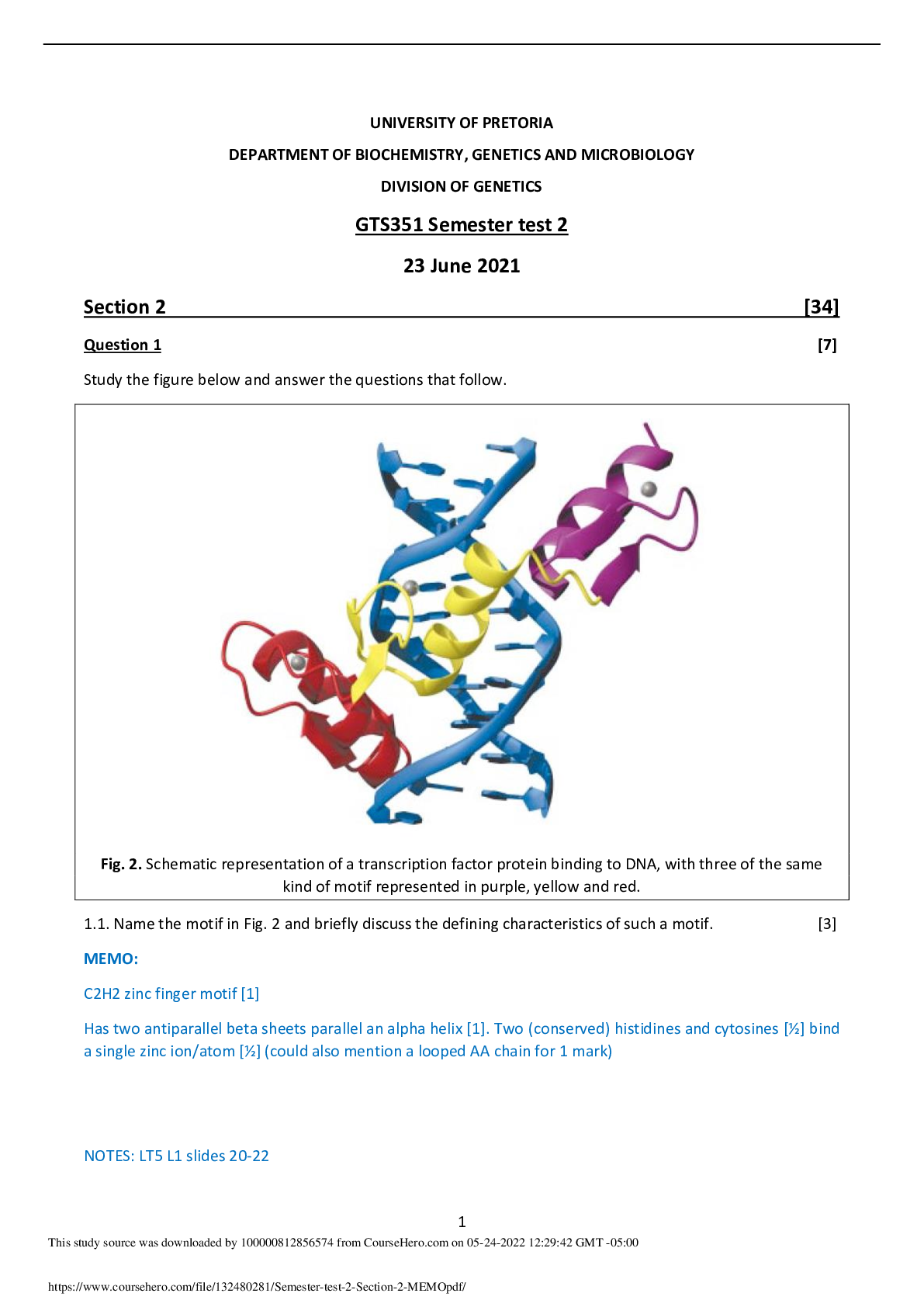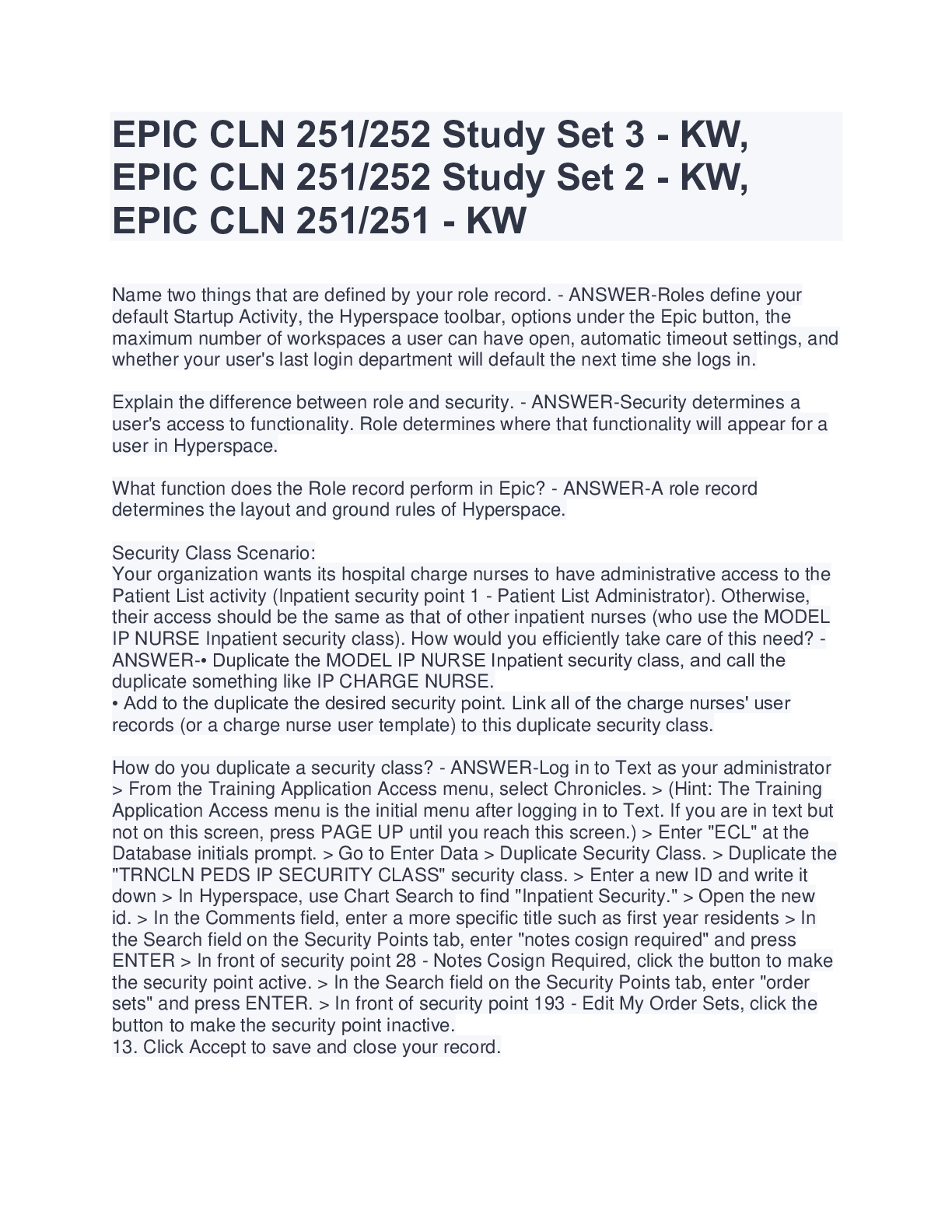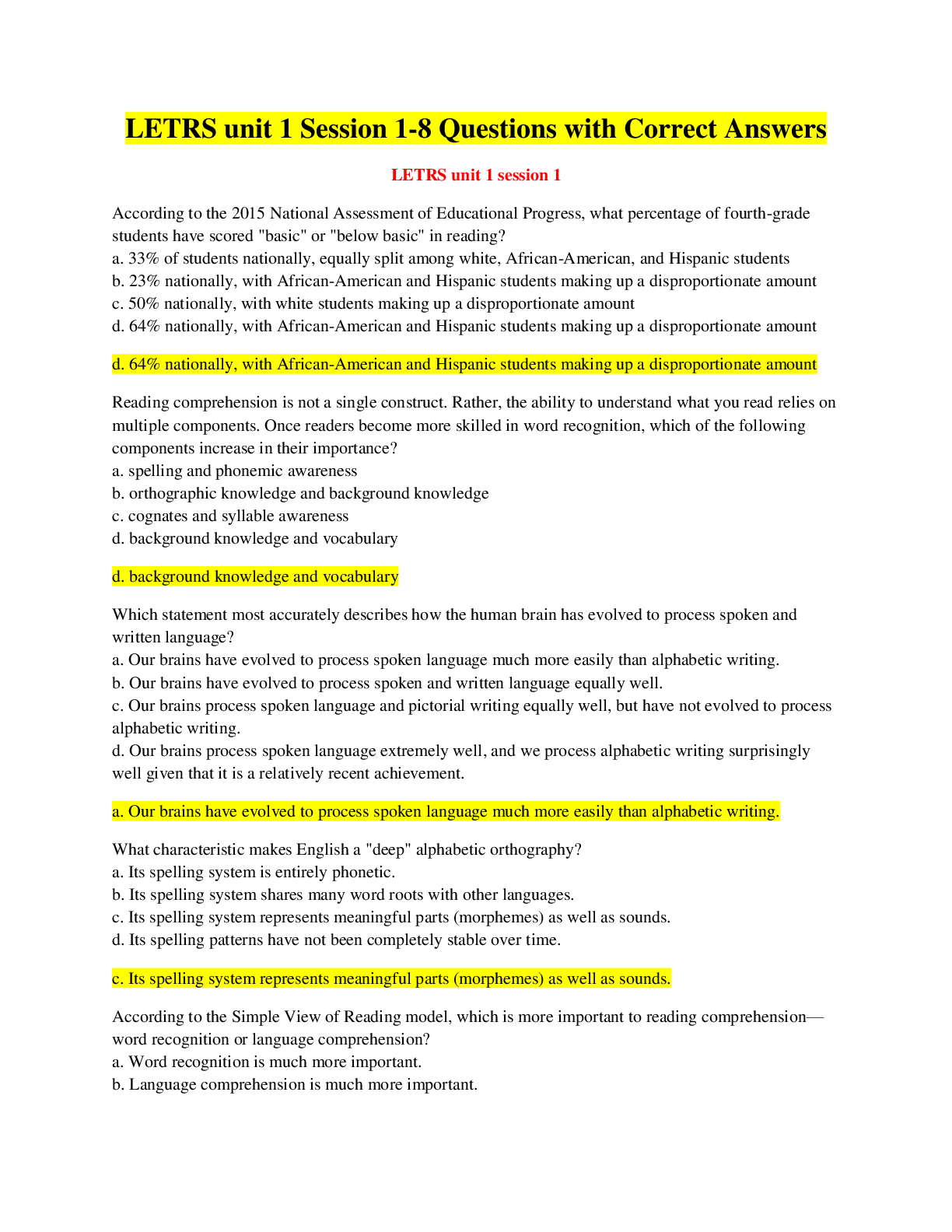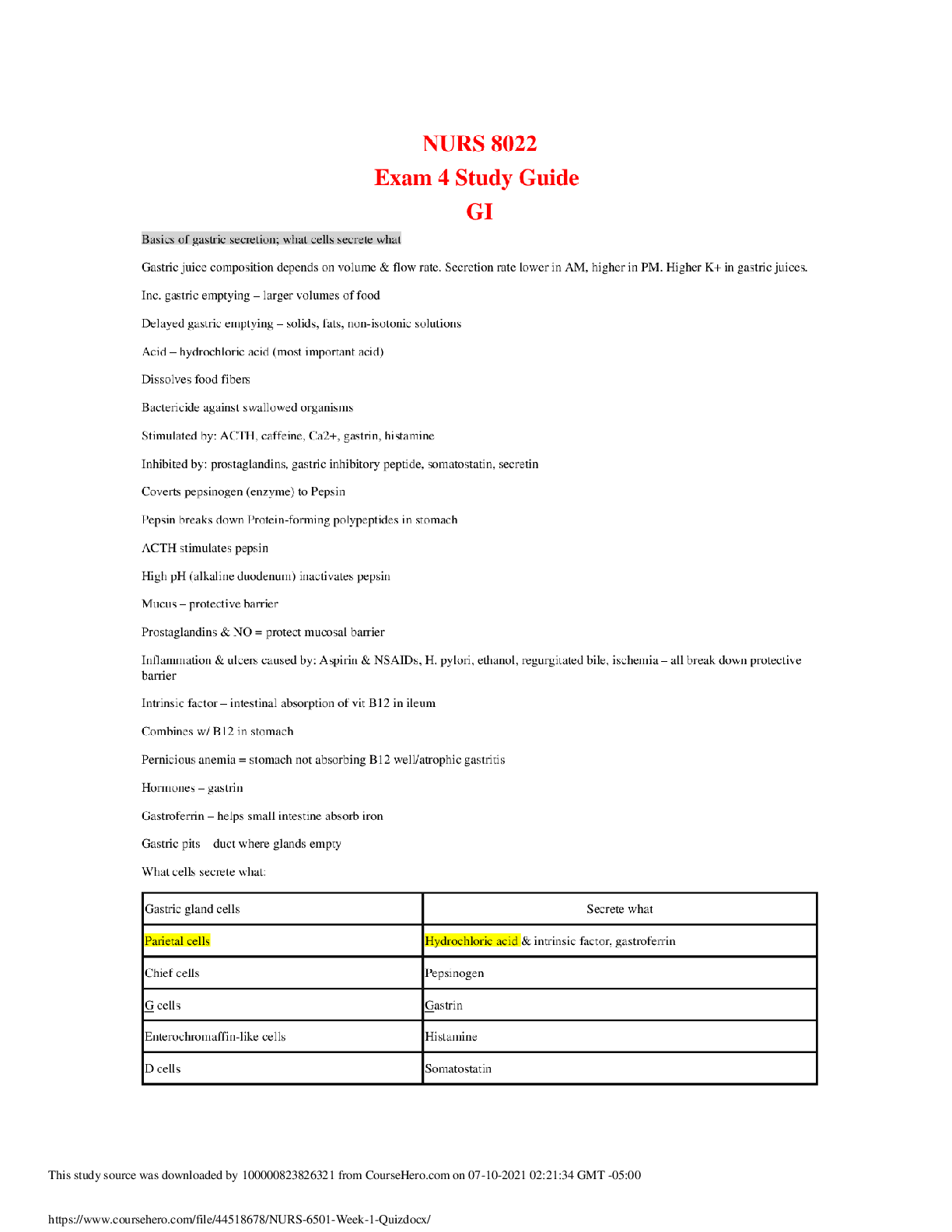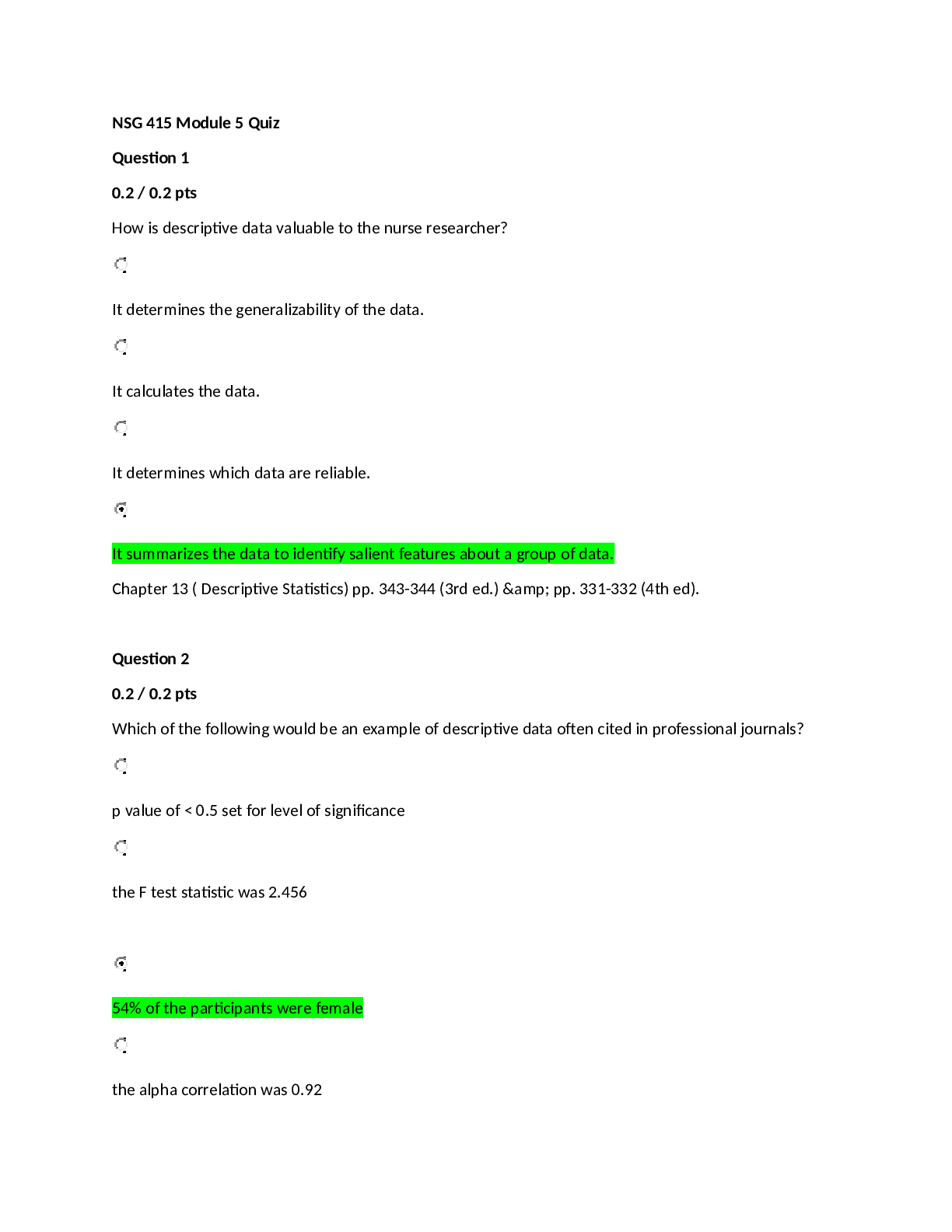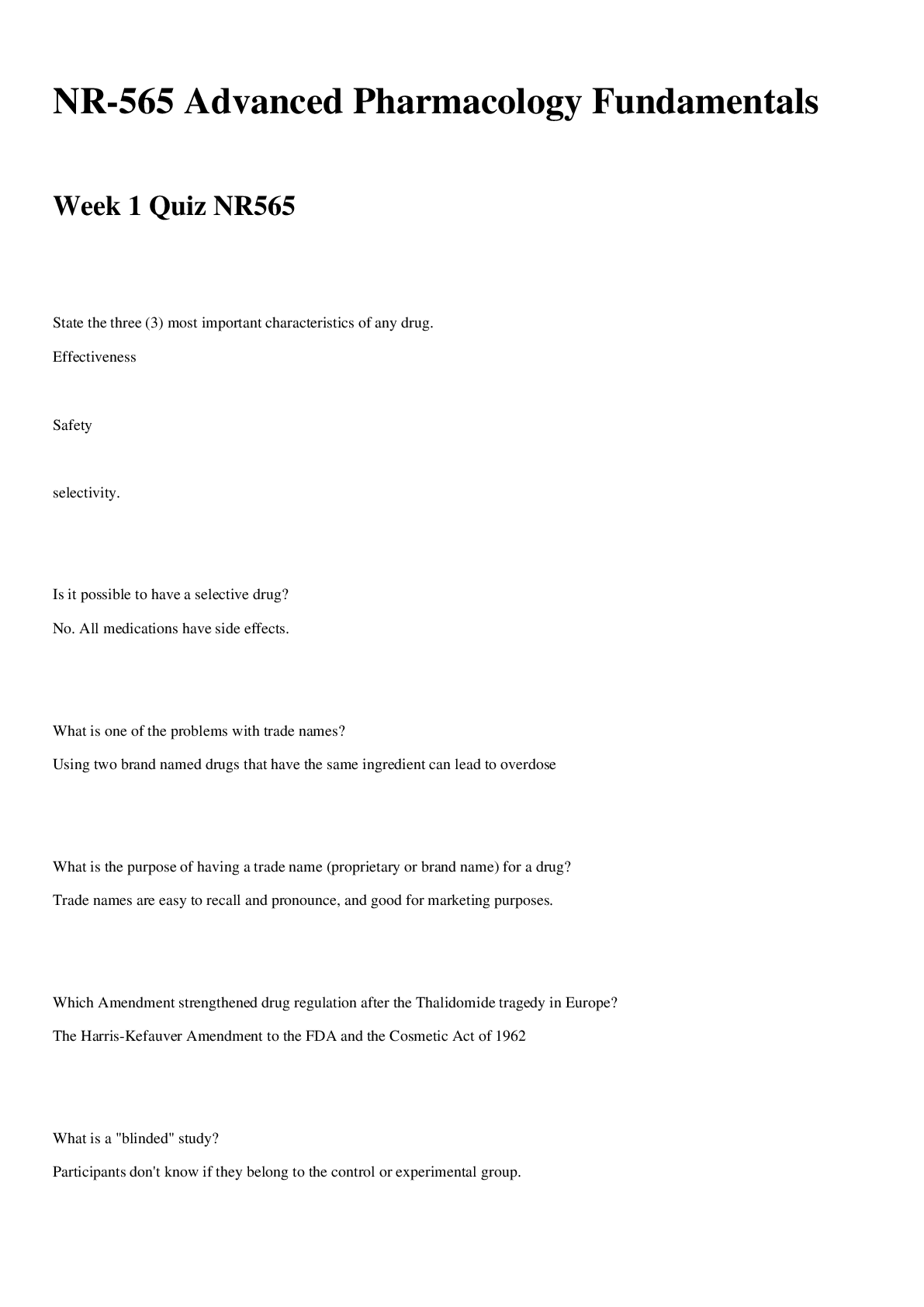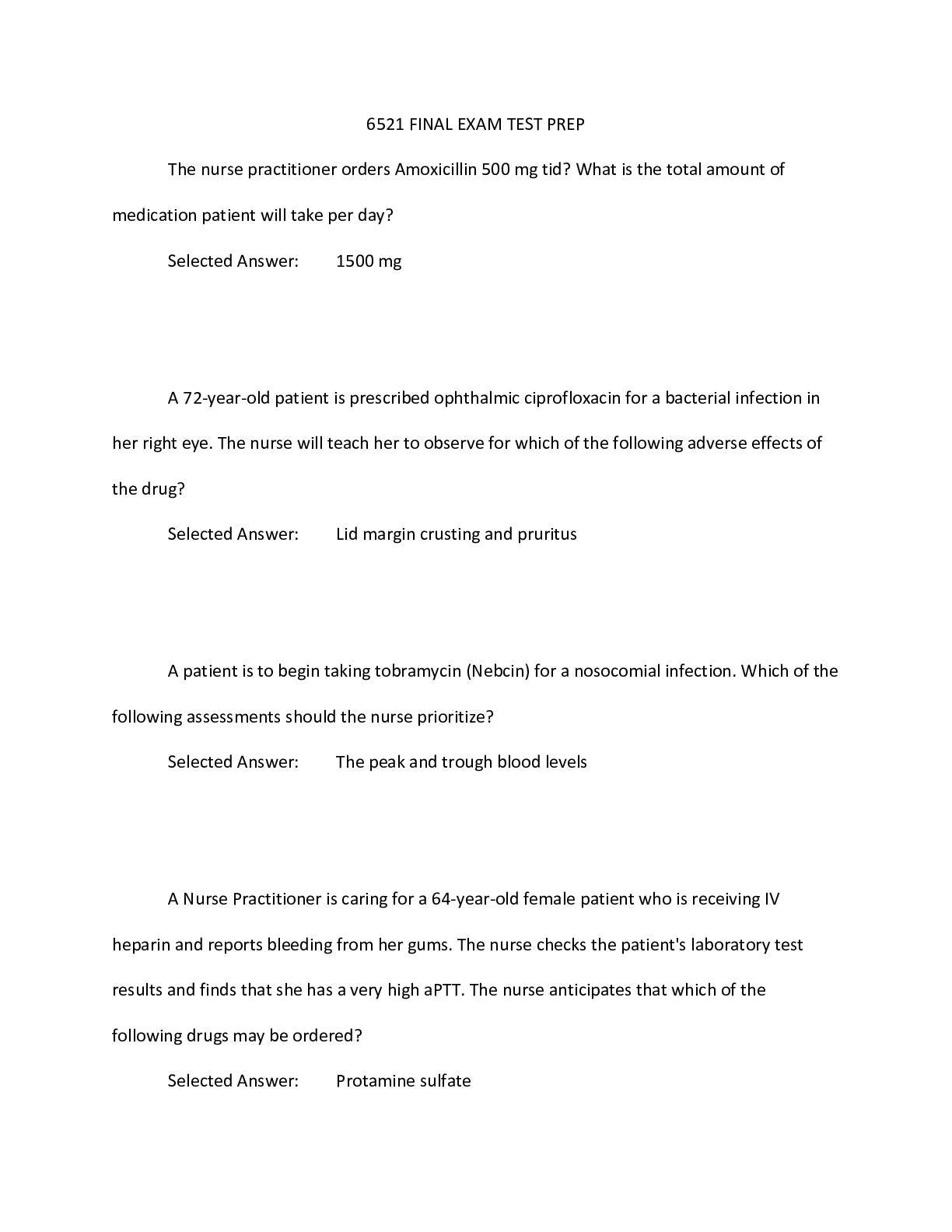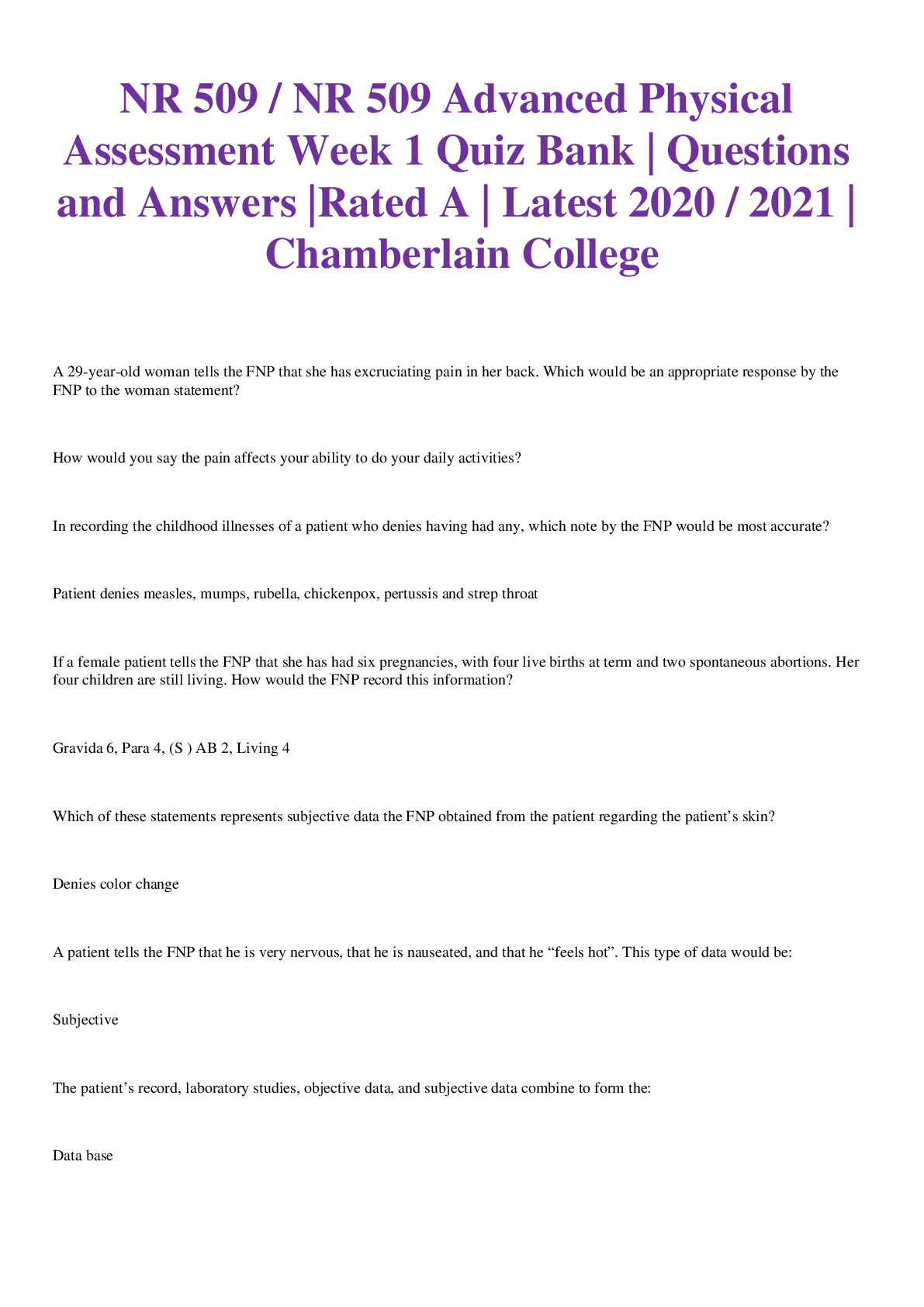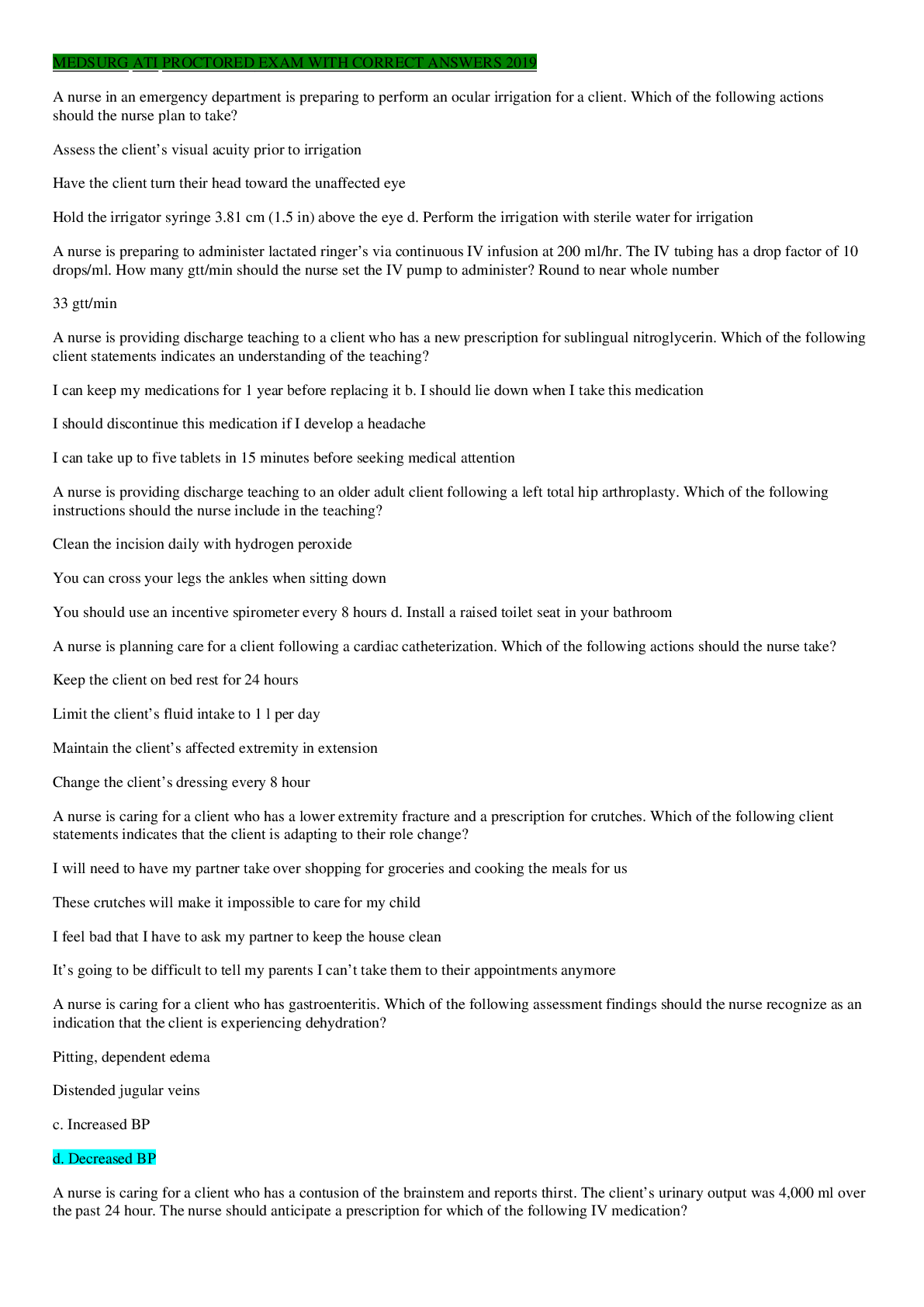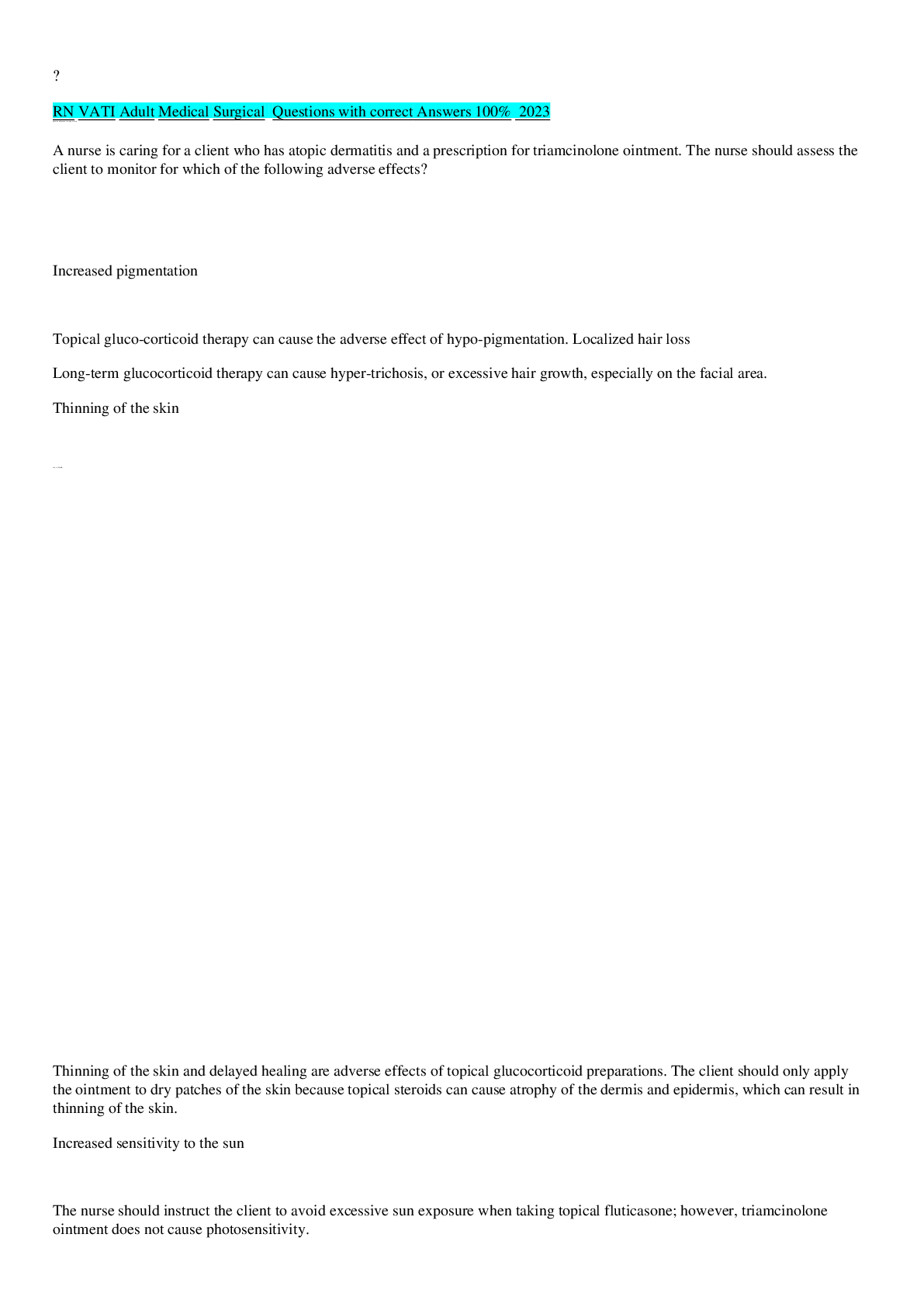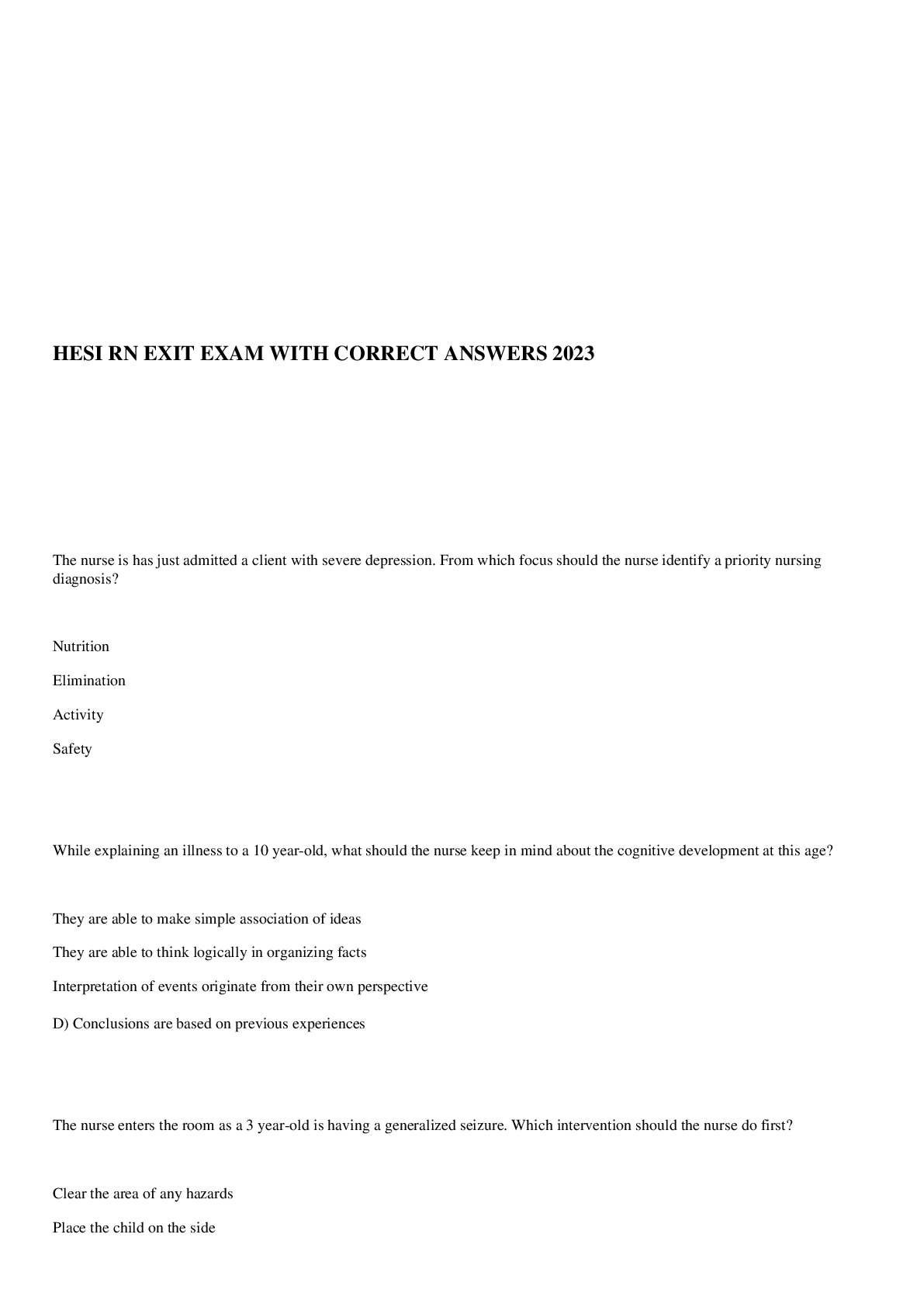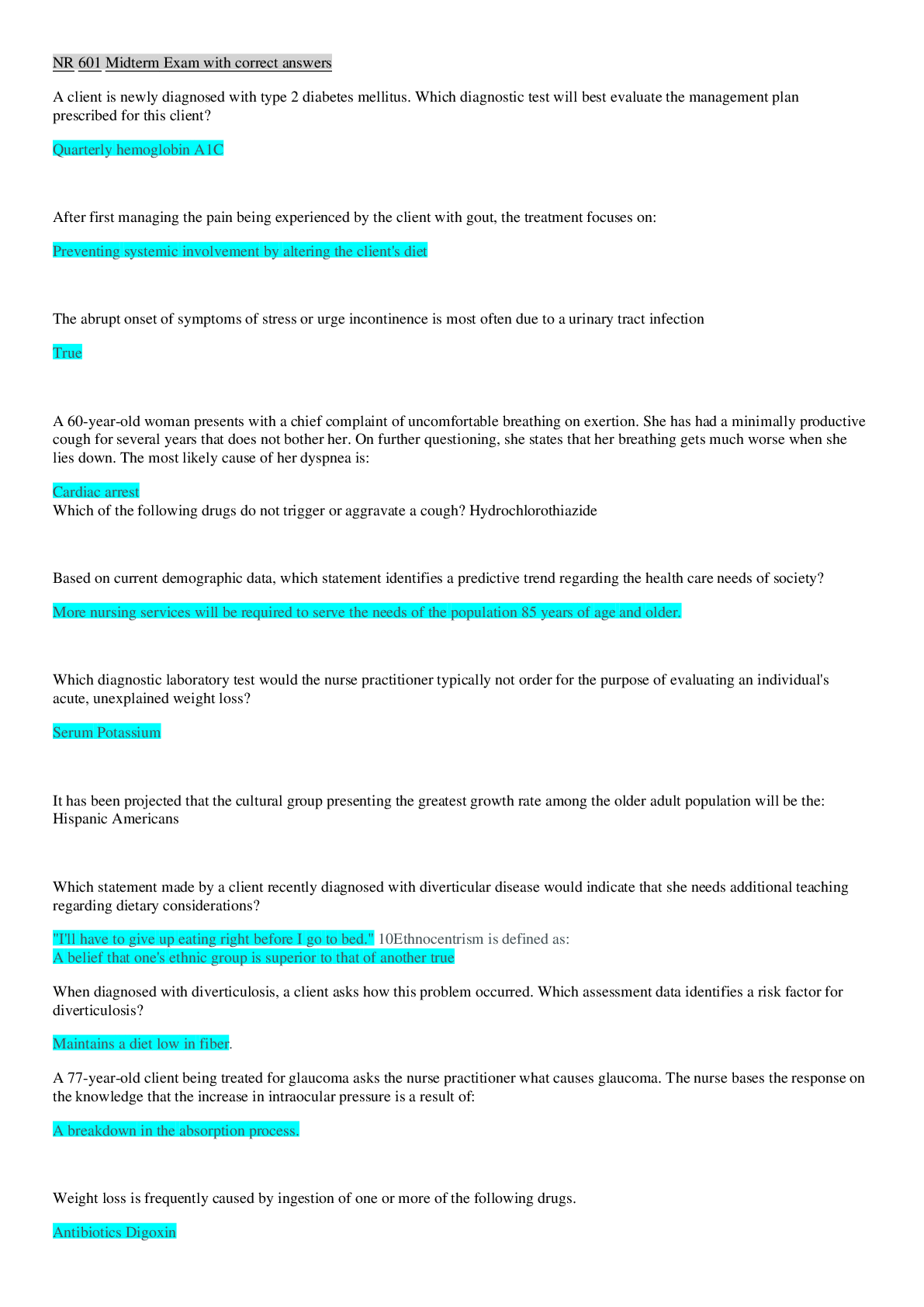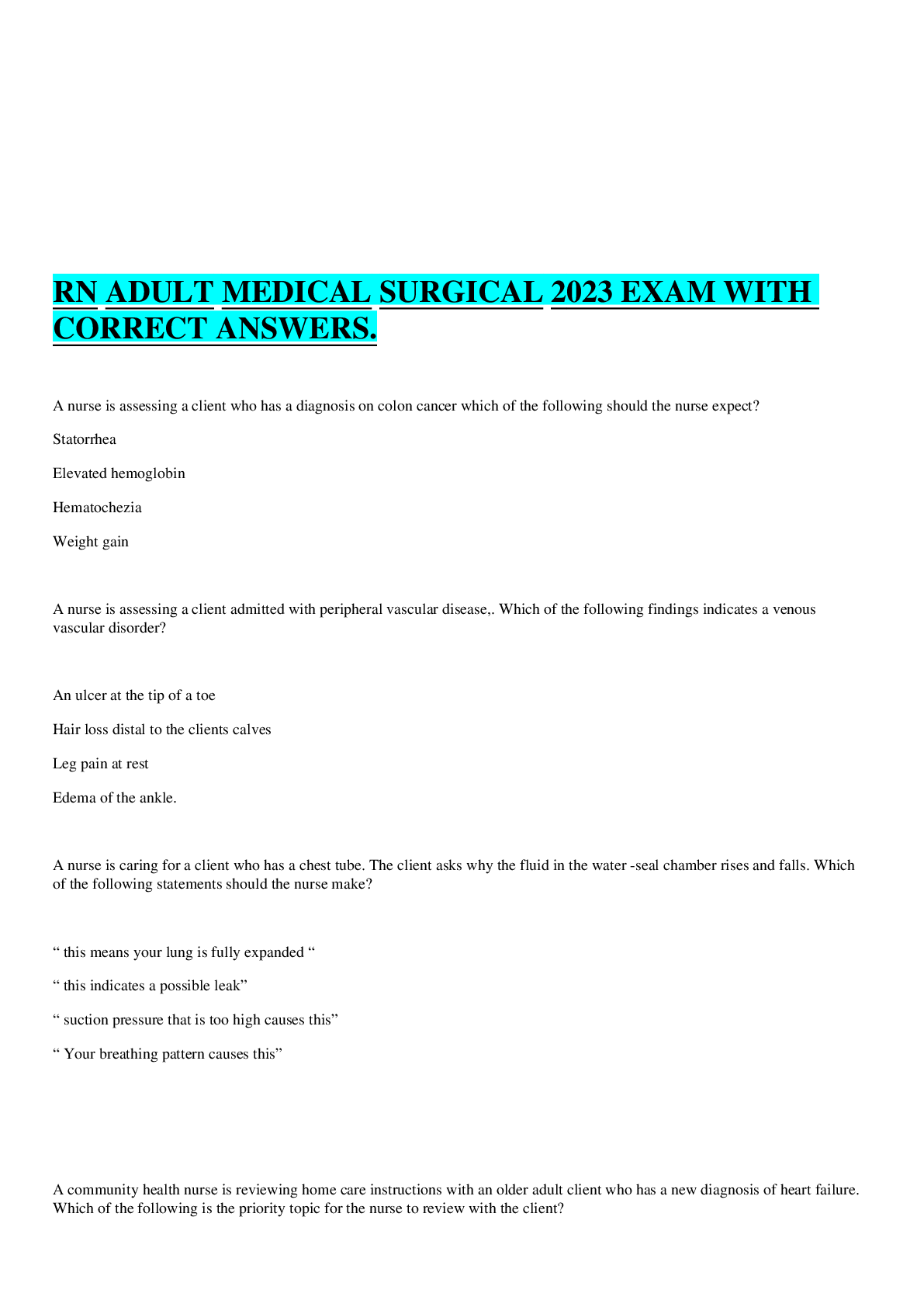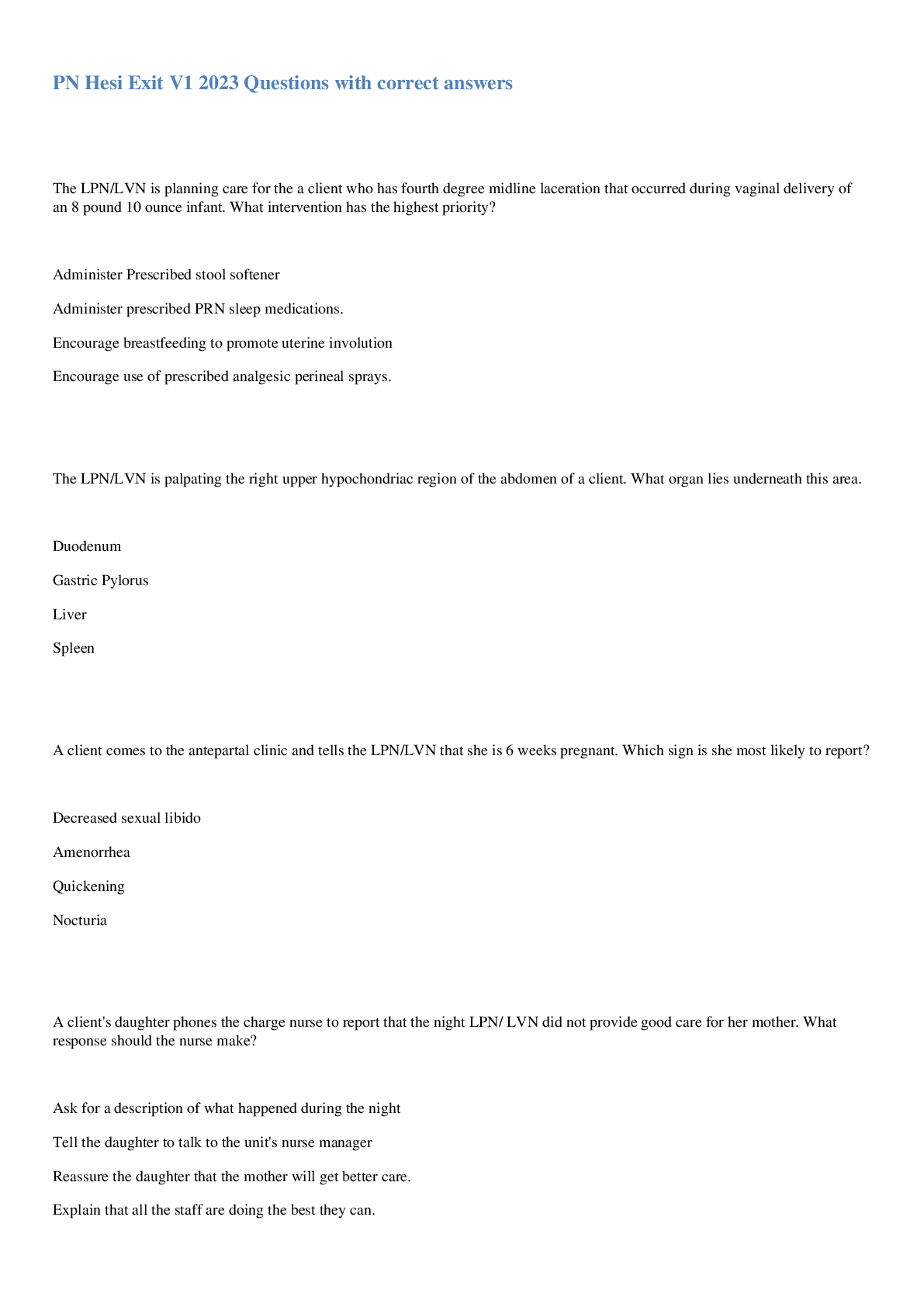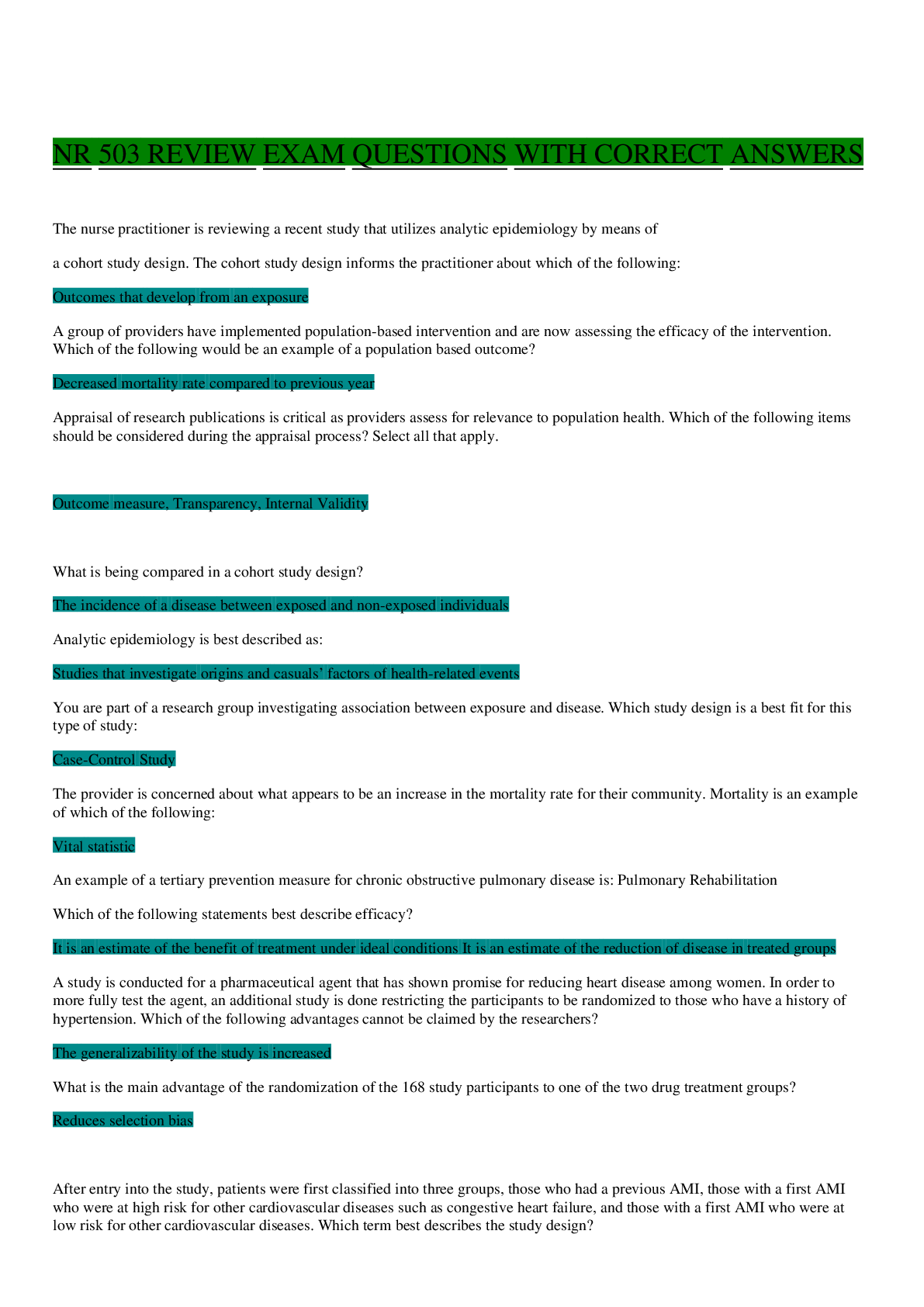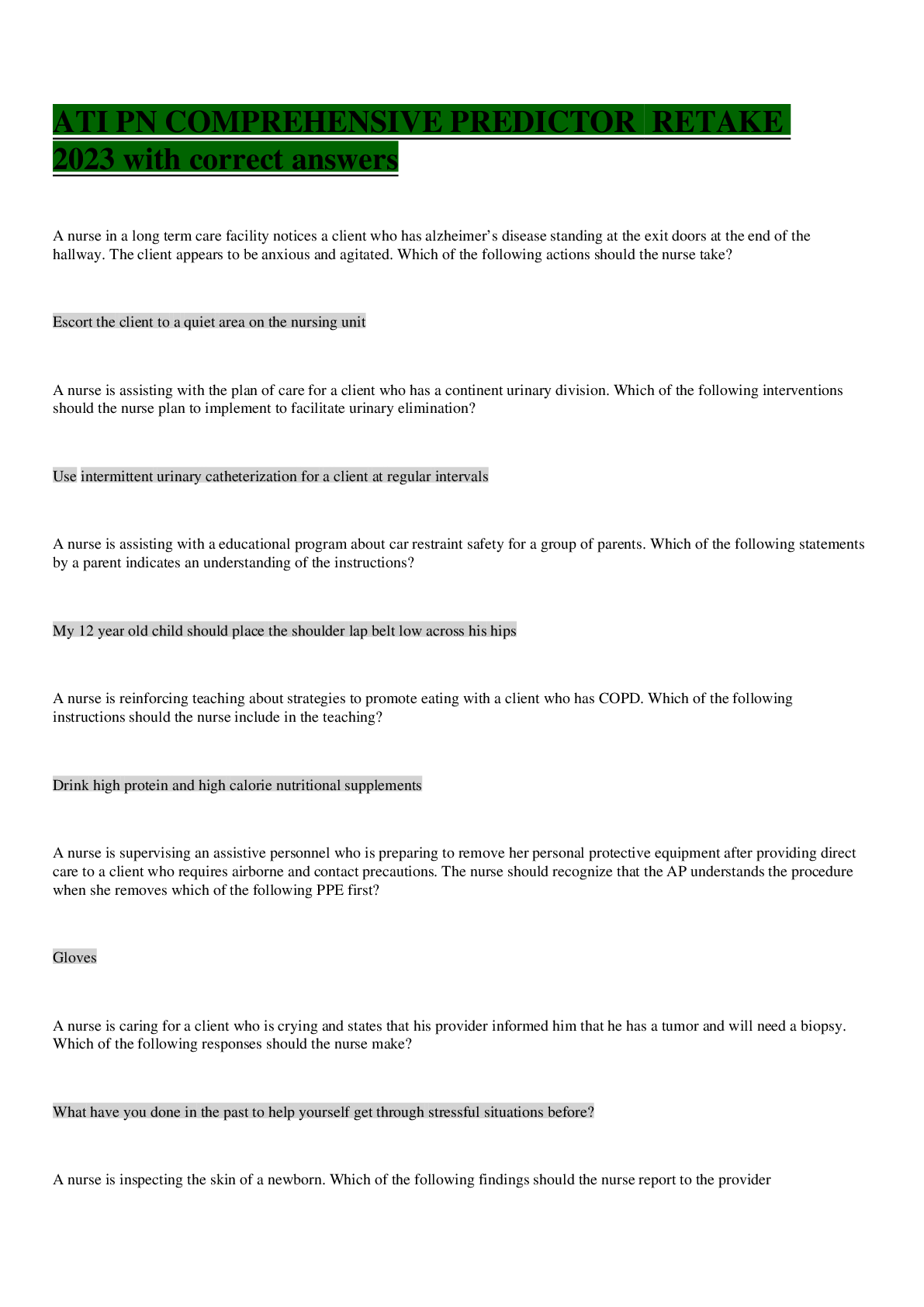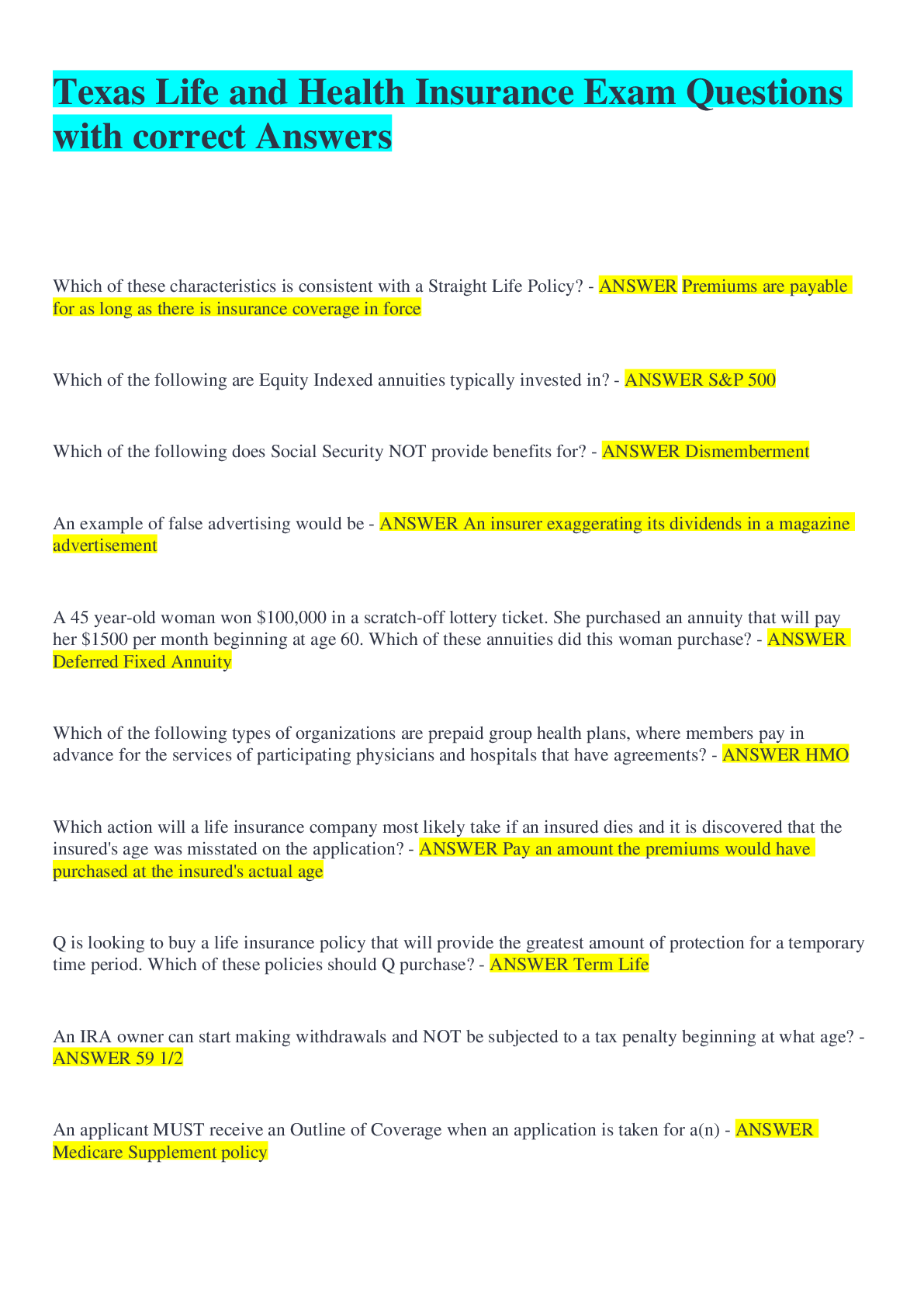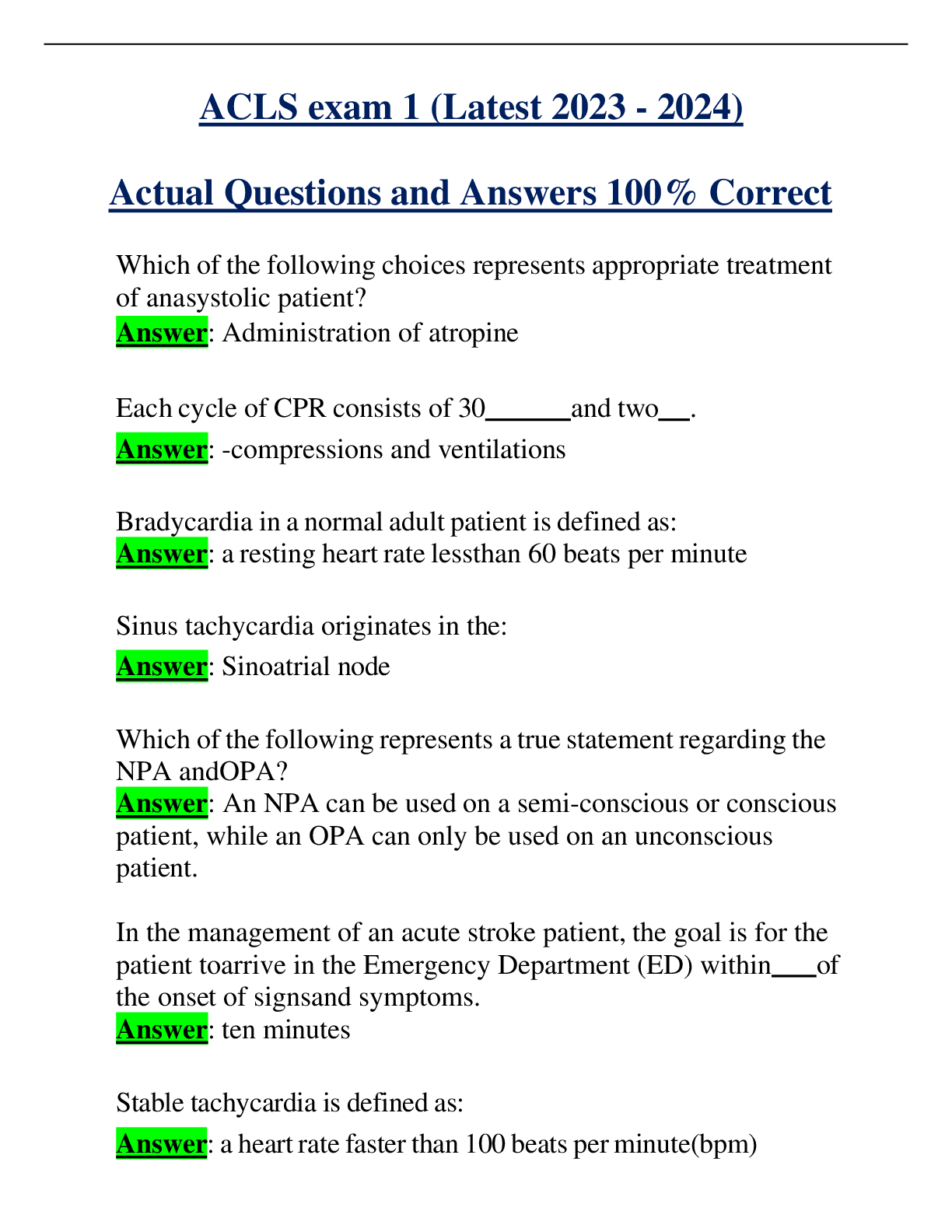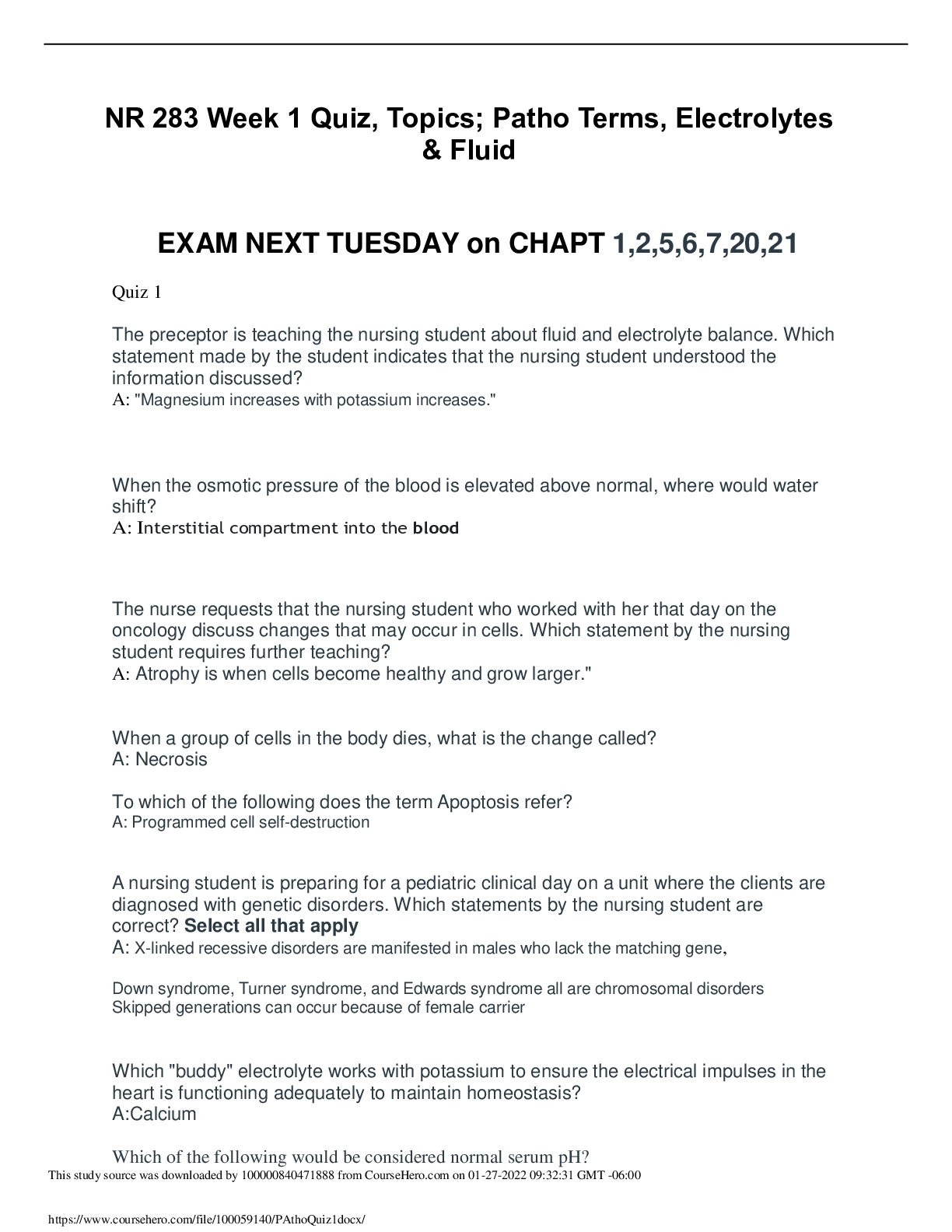Advanced Pharmacology Week 1 quiz WITH CORRECT ANSWERS GRADED A
Document Content and Description Below
1. The primary care NP sees a patient covered by Medicaid, writes a prescription for a medication, and is informed by the pharmacist that the medication is “off-formulary.” The NP should: (Points ... : 2) inform the patient that an out-of-pocket expense will be necessary. write the prescription for a generic drug if it meets the patient’s needs. call the patient’s insurance provider to advocate for this particular drug. contact the pharmaceutical company to see if medication samples are available. Question 2.2. A patient asks a primary care nurse practitioner (NP) about using over-the- counter medications to treat an upper respiratory infection with symptoms of cough, fever, and nasal congestion. The NP should: (Points : 2) recommend a cough preparation that also contains acetaminophen. suggest using single-ingredient products to treat each symptom separately. recommend a product containing antitussive, antipyretic, and decongestant ingredients. tell the patient that over-the-counter medications are usually not effective in manufacturer-recommended doses. Question 3.3. A patient has recurrent symptoms and tells the primary care NP that she can’t remember to take her medication all the time. The NP should: (Points : 2) give her shortened regimens of the drug to facilitate compliance. provide written information about her condition and the medication. administer the medication in the clinic to ensure that she takes the drug. ask her about her lifestyle, her schedule, and her understanding of her condition. Question 4.4. A woman who began taking a COCP 2 months ago calls the primary care NP to report having nausea every day. She takes a pill at the same time each morning. The NP should tell her to: (Points : 2) try taking the pill in the evening each day. come to the clinic for a urine pregnancy test. take the pill on an empty stomach with water. stop taking the pill for 7 days and then restart. Question 5.5. A primary care NP will begin practicing in a state in which the governor has opted out of the federal facility reimbursement requirement. The NP should be aware that this defines how NPs may write prescriptions: (Points : 2) without physician supervision in private practice. as CRNAs without physician supervision in a hospital setting. in any situation but will not be reimbursed for this by government insurers. only with physician supervision in both private practice and a hospital setting. Question 6.6. A parent calls a clinic for advice about giving an over-the-counter cough medicine to a 6-year-old child. The parent tells the NP that the medication label does not give instructions about how much to give a child. The NP should: (Points : 2) order a prescription antitussive medication for the child. ask the parent to identify all of the ingredients listed on the medication label. calculate the dose for the active ingredient in the over-the-counter preparation. tell the parent to approximate the dose at about one third to one half the adult dose. Question 7.7. A primary care NP sees a 5-year-old child who is morbidly obese. The child has an elevated hemoglobin A1c and increased lipid levels. Both of the child’s parents are overweight but not obese, and they tell the NP that they see nothing wrong with their child. They both state that it is difficult to refuse their child’s requests for soda or ice cream. The NP should: (Points : 2) suggest that they give the child diet soda and low-fat frozen yogurt. understand and respect the parents’ beliefs about their child’s self-image. initiate a dialogue with the parents about the implications of the child’s laboratory suggest family counseling to explore ways to improve parenting skills and limits. Question 8.8. A patient has been using an herbal supplement for 2 years that the primary care NP knows may have toxic side effects. The NP should: (Points : 2) tell the patient to stop taking the supplement immediately. refer the patient to a CAM provider who can manage this patient’s therapy. prescribe another herbal drug that has fewer adverse effects than the one the patient is taking. Question 9.9. A primary care NP has prescribed phentermine for a patient who is obese. The patient loses 10 lb in the first month but reports that the drug does not seem to be suppressing appetite as much as before. The NP should: (Points : 2) discontinue the phentermine. increase the dose of phentermine. continue the phentermine at the same dose. change to a combination of phentermine and topiramate. Question 10.10. A patient asks a primary care NP whether over-the-counter drugs are safer than prescription drugs. The NP should explain that over-the-counter drugs are: (Points : 2) drug. (FDA). generally safe when label information is understood and followed. safer because over-the-counter doses are lower than prescription doses of the same less safe because they are not well regulated by the Food and Drug Administration not extensively tested, so claims made by manufacturers cannot be substantiated. Question 11.11. As primary care nurse practitioners (NPs) continue to develop their role as prescribers of medications, it will be important to: (Points : 2) attain the same level of expertise as physicians who currently prescribe medications. learn from the experiences of physicians and develop expertise based on evidence- based practice. maintain collaborative and supervisorial relationships with physicians who will oversee prescribing practices. develop relationships with pharmaceutical representatives to learn about new medications as they are developed. Question 12.12. A woman who is being treated with radiotherapy for breast cancer asks her primary care nurse practitioner (NP) about using dietary supplements to improve her chance of recovery. The NP should tell her that: (Points : 2) vitamin E is not harmful but has not been shown to change outcomes. no supplements have been shown to alter outcomes or response to therapy. folic acid and other B vitamins may improve ability to tolerate chemotherapy. vitamin C, taken at least 6 days per week, may lower her risk of cancer recurrence. Question 13.13. The primary care nurse practitioner (NP) is using critical thinking skills when: (Points : 2) using standardized protocols to guide patient care. adhering to scientific principles to solve a patient problem. following the practices of seasoned mentors when giving care. analyzing current research and synthesizing new approaches to patient care. Question 14.14. CRNAs in most states: (Points : 2) must have a Drug Enforcement Administration (DEA) number to practice. must have prescriptive authority to practice. order and administer controlled substances but do not have full prescriptive authority. administer medications, including controlled substances, under direct physician supervision. Question 15.15. A patient comes to the clinic and asks the primary care NP about using a newly developed formulation of the drug the patient has been taking for a year. When deciding whether or not to prescribe this formulation, the NP should: (Points : 2) tell the patient that when postmarketing data is available, it will be considered. review the pharmaceutical company promotional materials about the new medication. prescribe the medication if it is less expensive than the current drug formulation. prescribe the medication if the new drug is available in an extended-release form. Question 16.16. The primary care NP is prescribing a medication for an off-label use. To help prevent a medication error, the NP should: (Points : 2) write “off-label use” on the prescription and provide a rationale. call the pharmacist to explain why the instructions deviate from common use. write the alternative drug regimen on the prescription and send it to the pharmacy. tell the patient to ignore the label directions and follow the verbal instructions given in the clinic. Question 17.17. A 50-year-old woman with a family history of CHD is experiencing occasional hot flashes and is having periods every 3 to 4 months. She asks the primary care NP about HT to relieve her symptoms. The NP should: (Points : 2) prescribe estrogen-only therapy. initiate oral contraceptive pills now. discuss using bioidentical HT. plan to use estrogen-progesterone therapy when menopause begins. Question 18.18. To increase the likelihood of successful pharmacotherapy, when teaching a patient about using a medication, the primary care nurse practitioner (NP) should: (Points : 2) encourage the patient to participate in the choice of the medication. provide education about the medication actions and adverse effects. stress the importance of taking the medication exactly as it is prescribed. give the patient copies of medication package inserts describing the drug use. Question 19.19. A primary care NP is developing a clinical practice guideline for management of a patient population in a midsized suburban hospital. The NP should: (Points : 2) use an existing guideline from a leading research hospital. follow the guideline provided by a third-party payer to help ensure reimbursement. review expert opinion and experimental, anecdotal, correlational study data. write the guideline to adhere to long-standing practice protocols already in use. Question 20.20. A patient asks a primary care NP why herbal supplements are not regulated by the FDA. The nurse practitioner should tell the patient these products are not regulated by the FDA because they are: (Points : 2) natural, plant-based products and not man-made. not marketed as products that can treat or cure disease. regulated by the Dietary Supplement Health and Education Act. covered by the Hatch-Richardson Bill of 1992, which allows them to make health claims without FDA approval. Question 21.21. A woman comes to the clinic to talk about weight reduction. The primary care nurse practitioner (NP) calculates a body mass index (BMI) of 28. The woman’s waist measures 34 inches. The woman tells the NP that she would like to lose 20 lb for her daughter’s wedding in 6 months. The NP should: (Points : 2) suggest she try over-the-counter (OTC) orlistat. consider prescribing phentermine short-term. discuss her short-term and long-term weight loss goals. give her information about physical activity and diet modification. Question 22.22. A primary care NP is prescribing a drug for a patient who does not take any other medications. The NP should realize that: (Points : 2) CYP450 enzyme reactions will not interfere with this drug’s metabolism. substrates such as alcohol cannot interfere with the drug when the patient is abstaining. food-drug interactions are limited to those where food enhances or inhibits drug absorption. a thorough history of diet, alcohol use, smoking, and over-the-counter and herbal products is required. Question 23.23. A patient comes to the clinic reporting dizziness and fatigue associated with nausea and vomiting. The primary care NP suspects anemia and orders a complete blood count. The patient’s hemoglobin is elevated. The NP correctly concludes that the patient is not anemic. The NP has made an error in: (Points : 2) context formulation. inappropriate knowledge base. cost-versus-benefit analysis. hypothesis triggering and information processing. Question 24.24. A primary care nurse practitioner (NP) prescribes a drug to an 80-year-old African-American woman. When selecting a drug and determining the correct dose, the NP should understand that the knowledge of how age, race, and gender may affect drug excretion is based on an understanding of: (Points : 2) bioavailability. pharmacokinetics. pharmacodynamics. anatomy and physiology. Question 25.25. A patient with chronic back pain that is unrelieved by prescription analgesic medications asks a primary care nurse practitioner (NP) about acupuncture treatments. The NP should tell this patient: (Points : 2) biofield therapy has been shown to be more effective than acupuncture. creatine has been shown to be an effective herbal choice to treat back pain. there is no valid research documenting the efficacy of this treatment for pain. most studies that show benefits of alternative therapies are based on observation. [Show More]
Last updated: 1 year ago
Preview 1 out of 6 pages
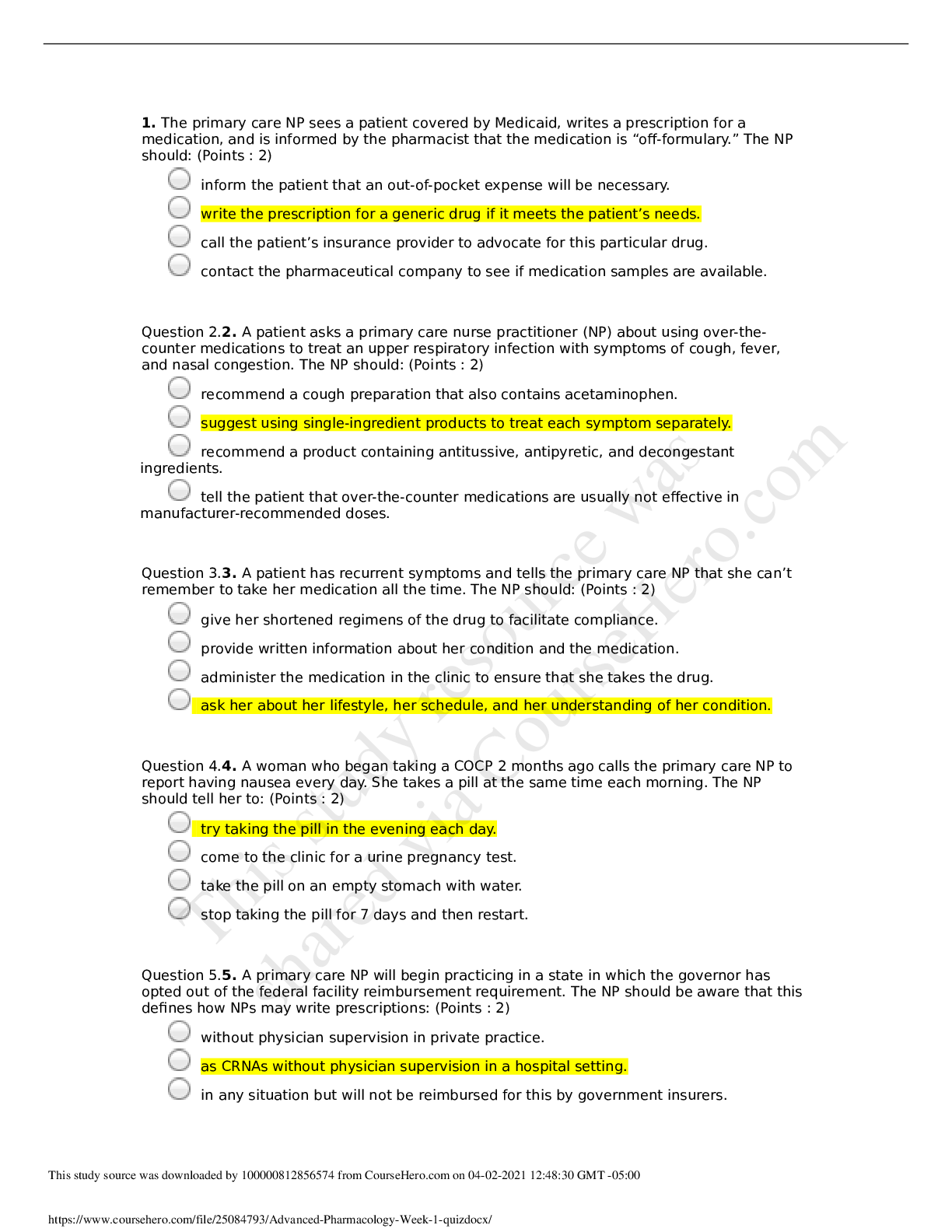
Reviews( 0 )
Document information
Connected school, study & course
About the document
Uploaded On
Apr 02, 2021
Number of pages
6
Written in
Additional information
This document has been written for:
Uploaded
Apr 02, 2021
Downloads
0
Views
65
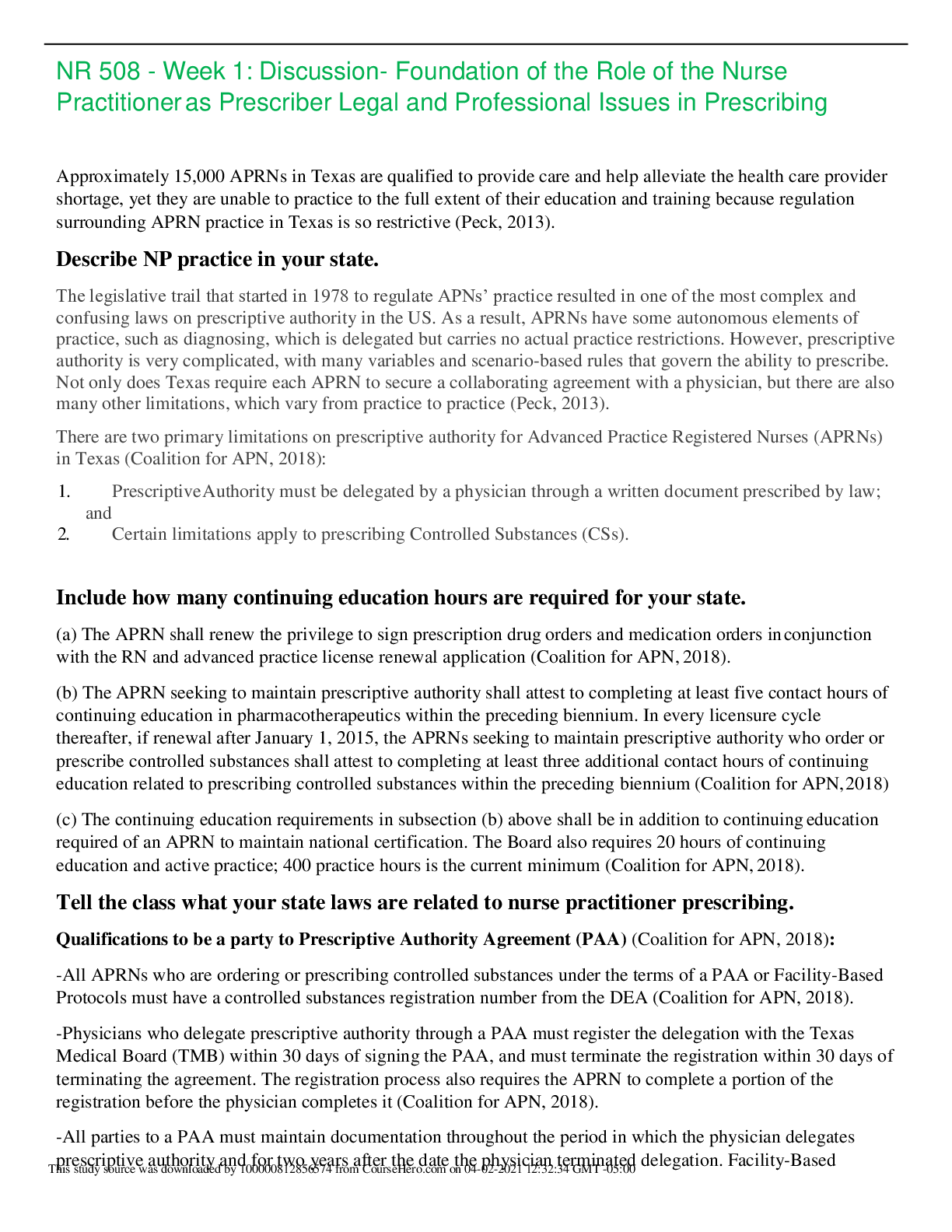

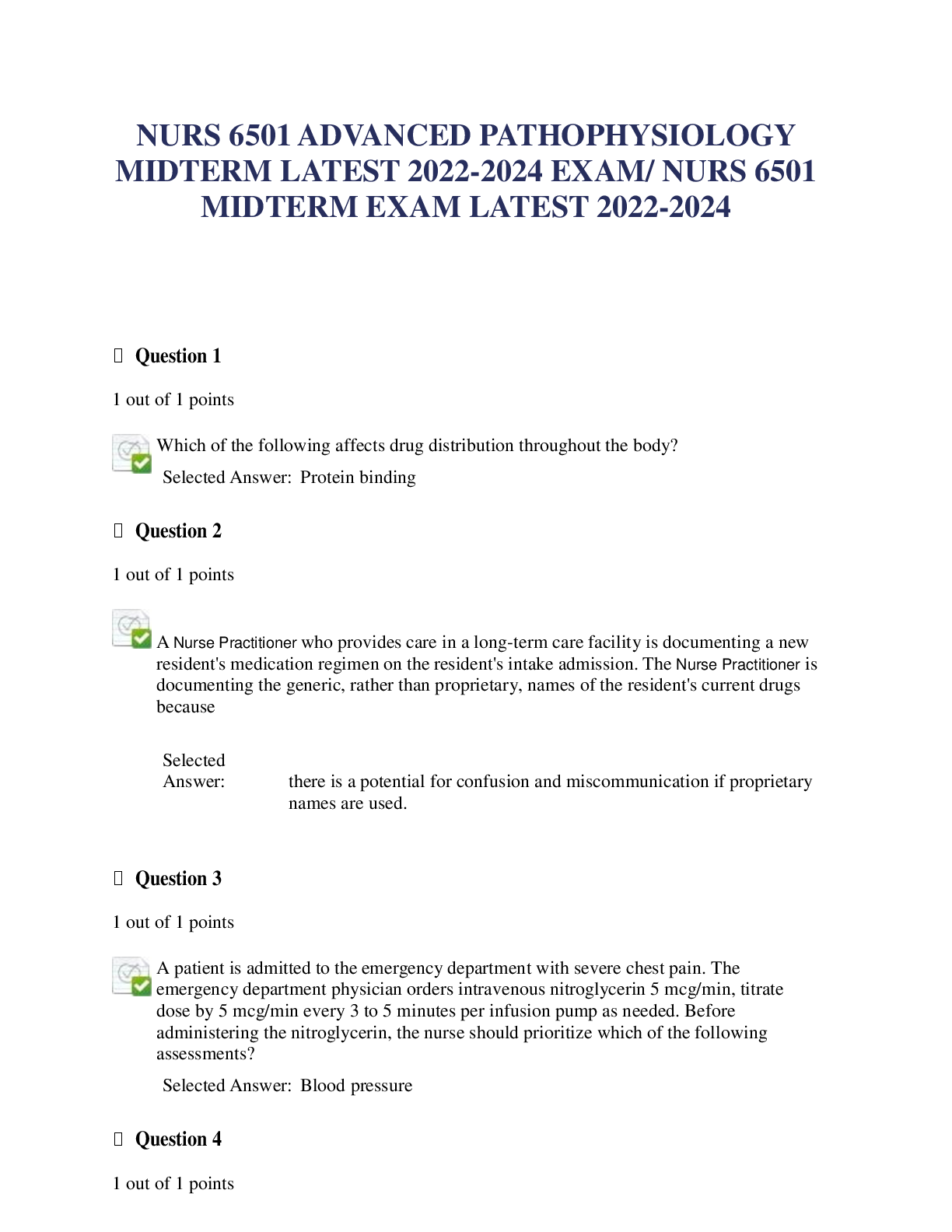
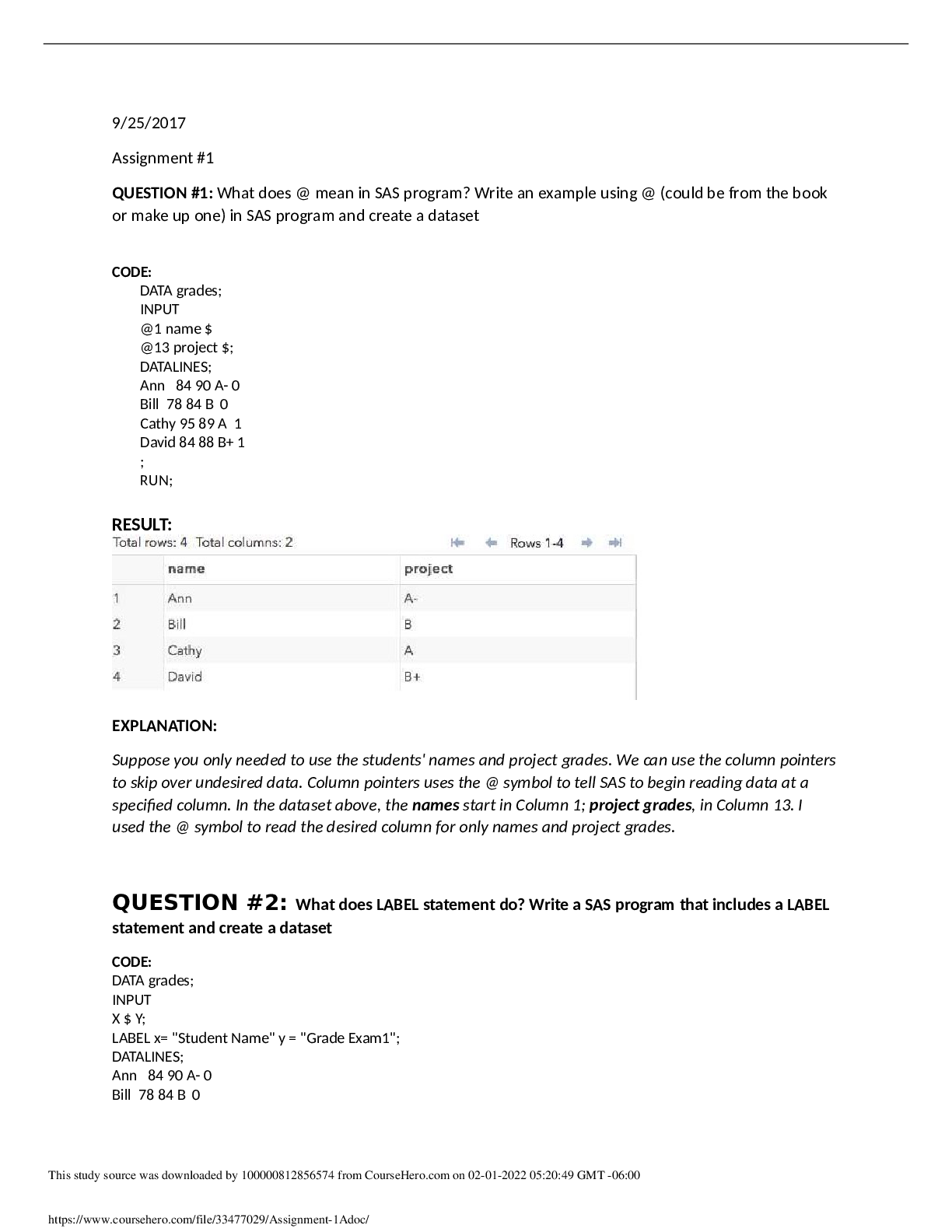
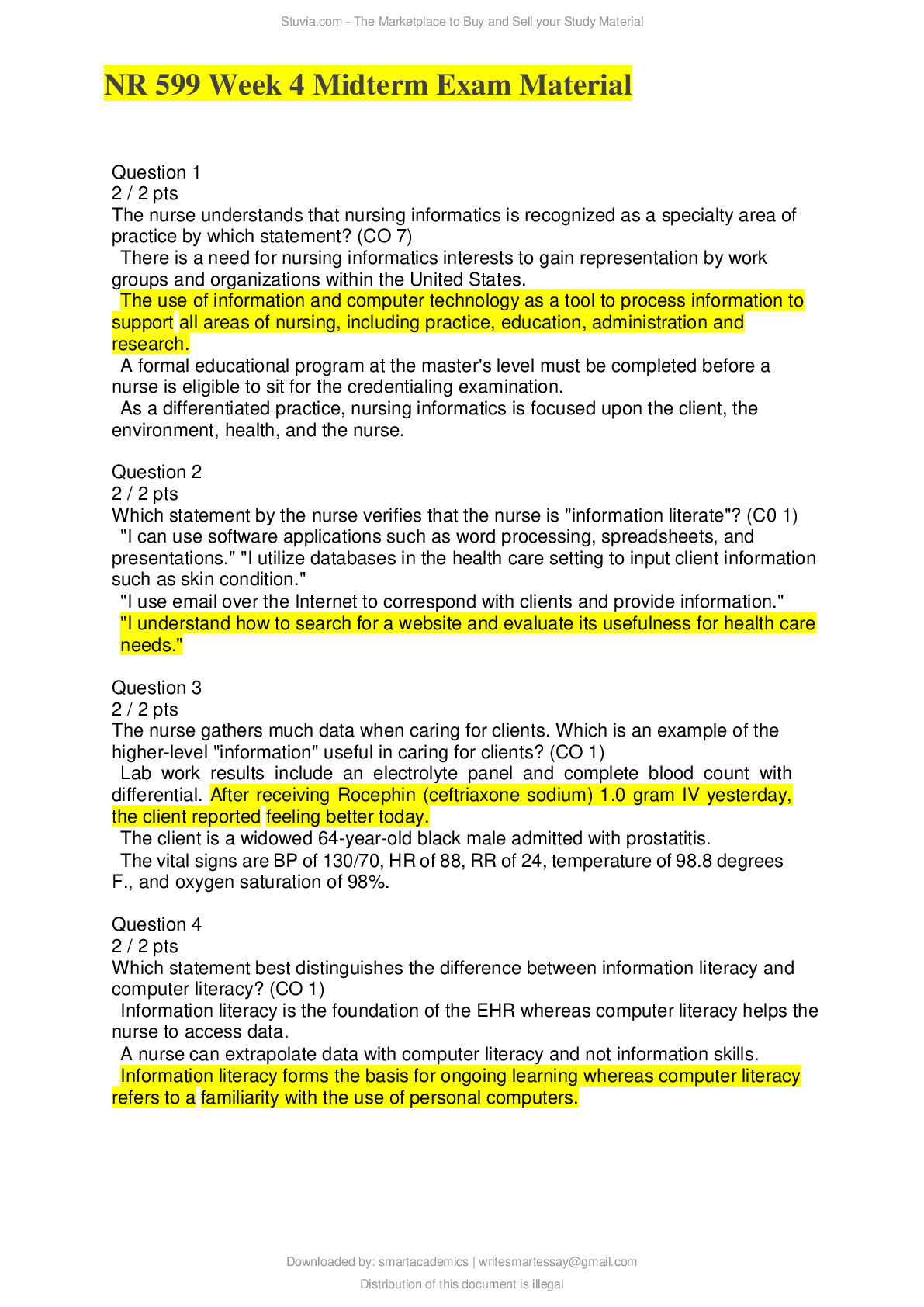
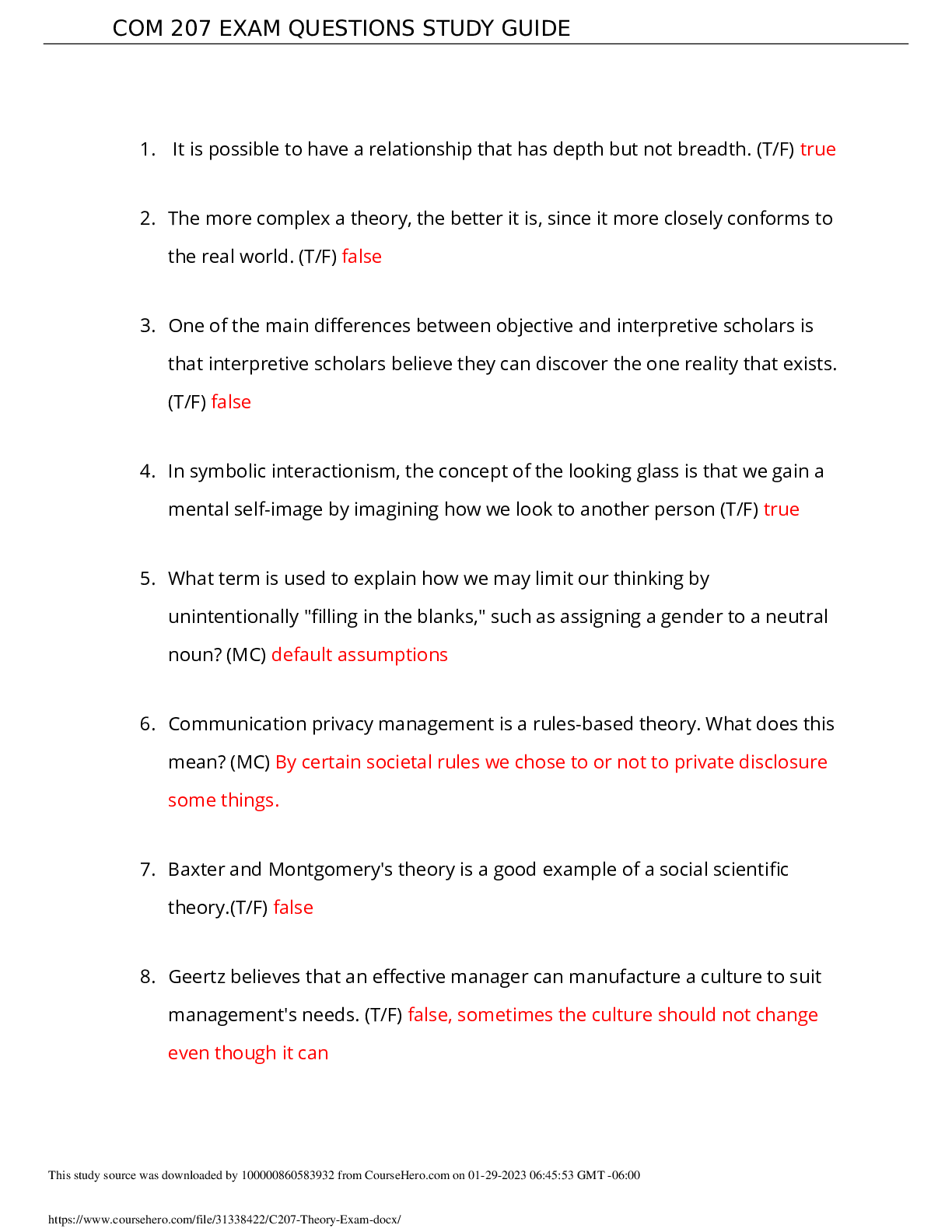
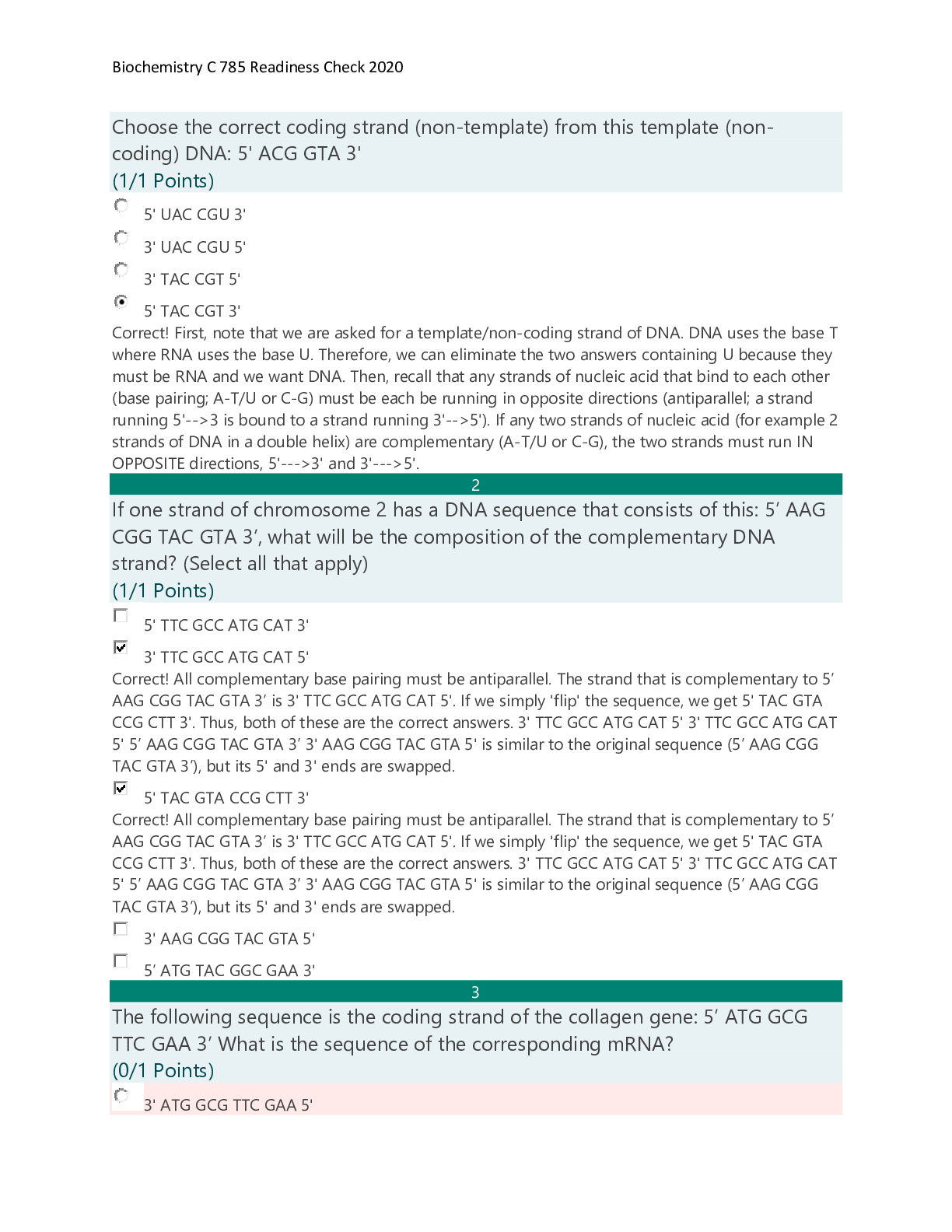
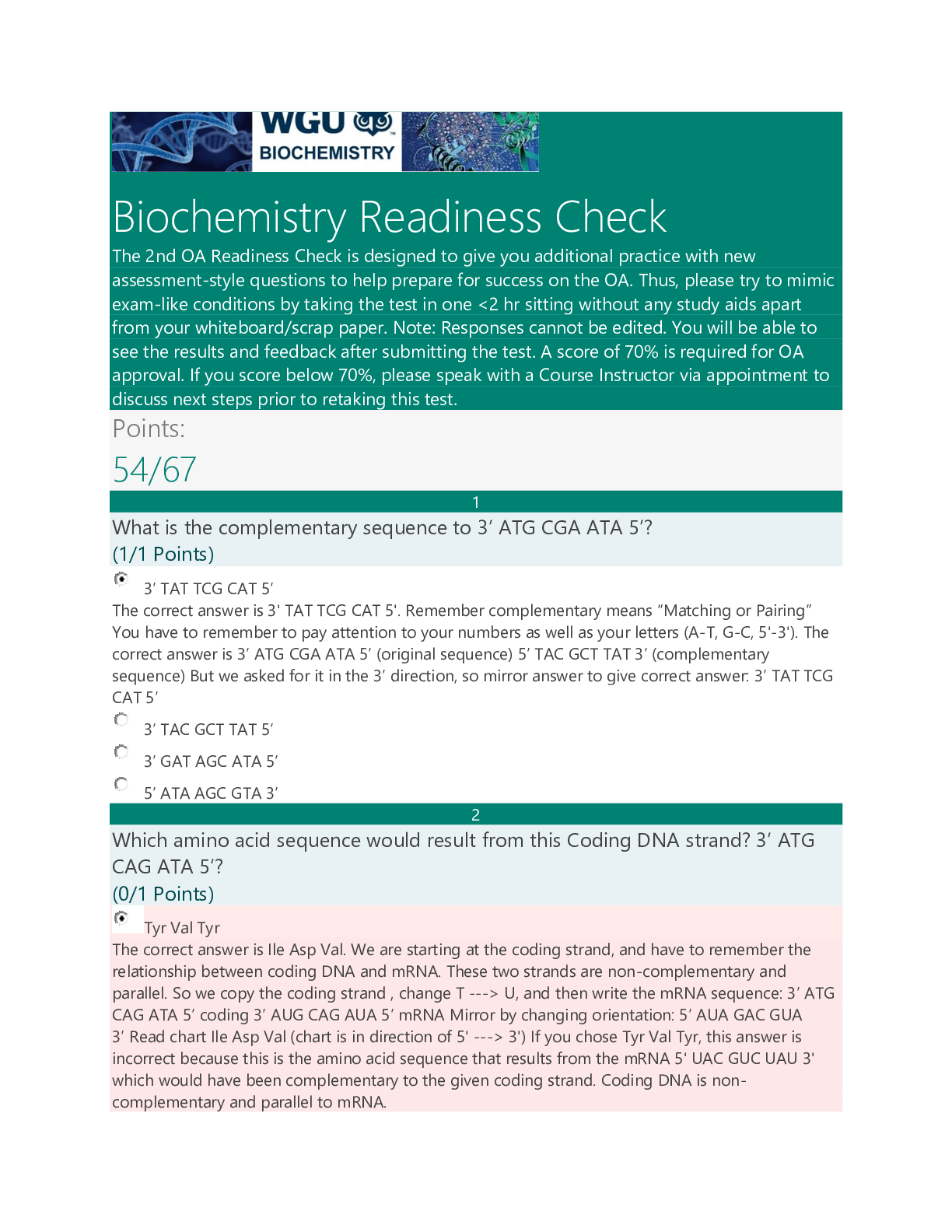


.png)

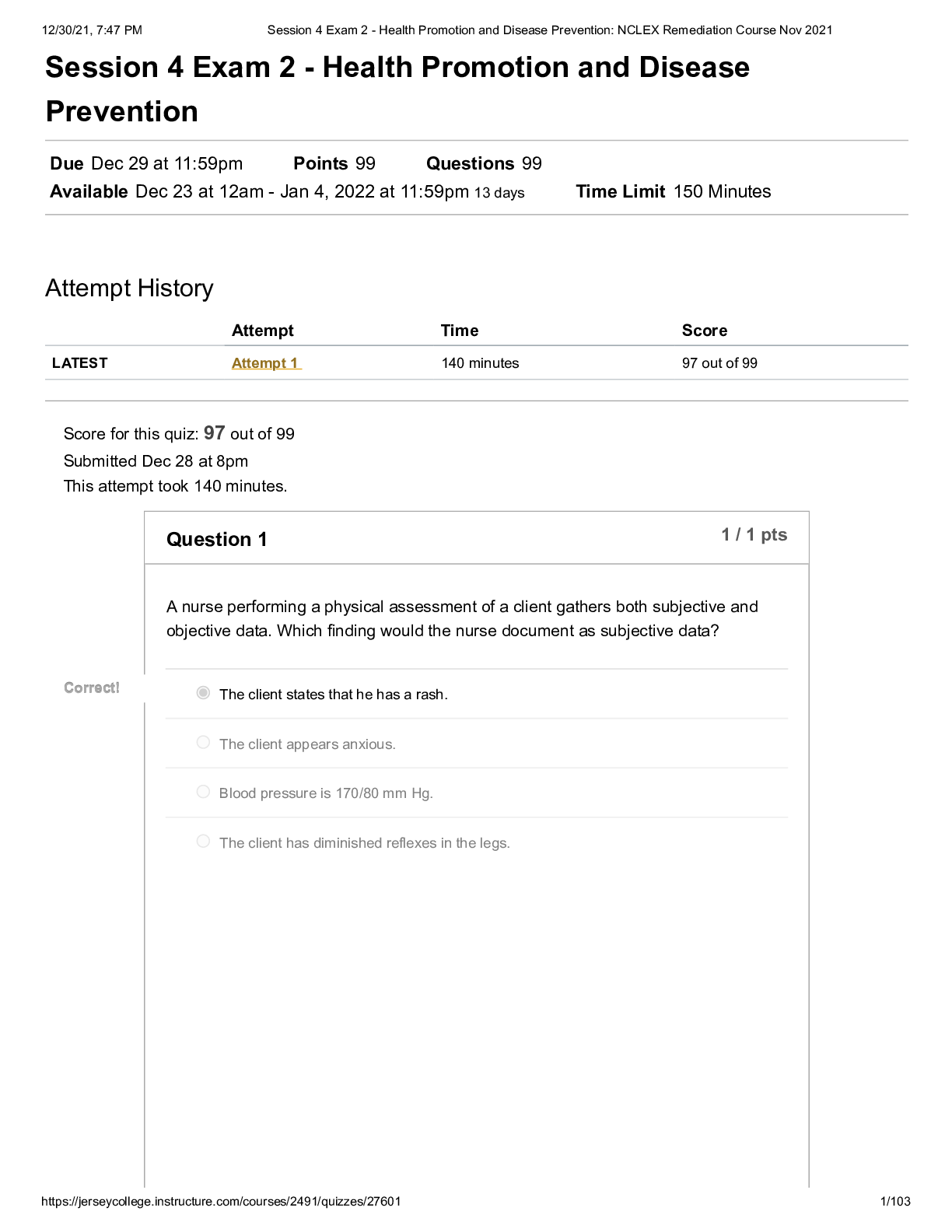
 ORGMED ORGANIC PHARMACEUTICAL PHARMACY.png)


